OPINIONS
Columnist Cameron Walker weighs the pros and cons of having Spring Break plans. A12
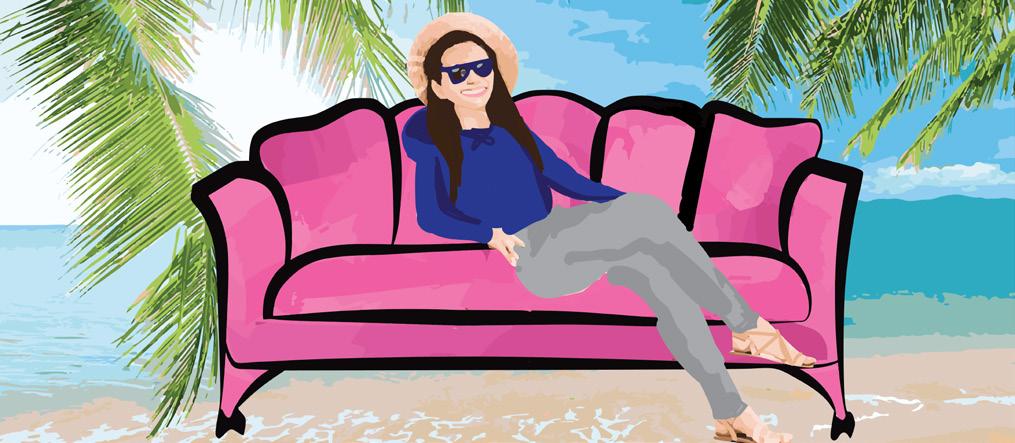
MAGAZINE
Students reflect on the return of study abroad after facing cancellations due to the pandemic. A7
 By EliZa hErnandEZ Editorial Assistant
By EliZa hErnandEZ Editorial Assistant
The Boston College Board of Trustees voted to raise undergraduate tuition to $62,950 for the 2022–23 academic year, a $2,420 increase from the previous year’s tuition, according to a University release.
The total cost of attendance will rise to $80,296 including the price of room and board, fees, and tuition—a 3.68 percent increase from this year.
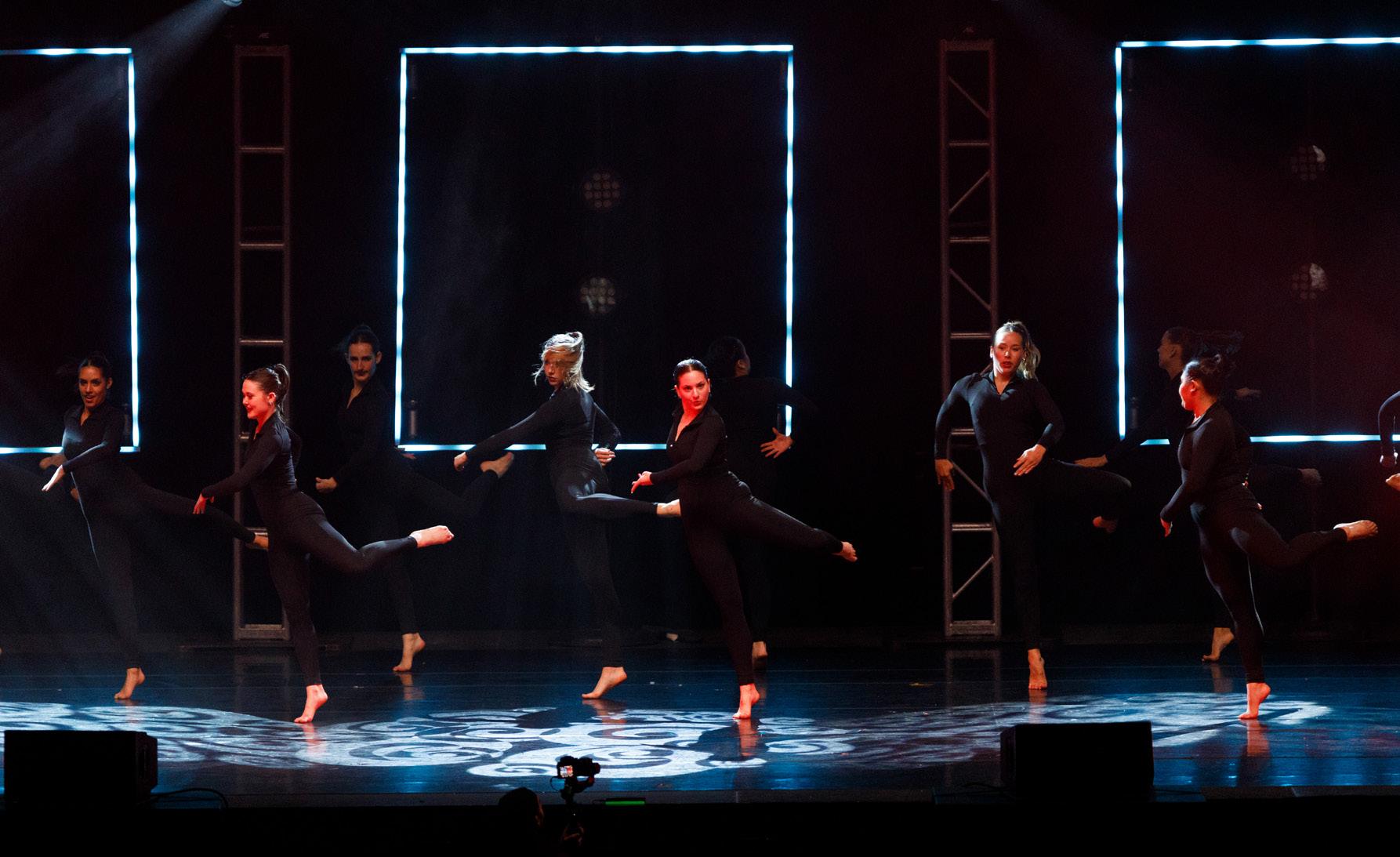
The University also voted to increase need-based undergraduate financial aid by 4.43 percent to a total of $157 million.
“Boston College remains one of only 21 private universities in the United States that is need-blind in admissions and meets the full-demonstrated need of all undergraduate students,” said Associate Vice President for University Communications Jack Dunn in the release.
Financial aid funds rose 0.75 percent more than the total cost of attendance. Dunn wrote that BC’s decision to increase financial aid reflects its commitment to ensuring accessibility to students from diverse socioeconomic backgrounds.
Dunn also wrote that BC is ranked 39th in the “Best Value Schools” in U.S.
News & World Report and placed 19th in Kiplinger’s Personal Finance magazine’s “Best Values” category.
“Overall, more than 67 percent of Boston College undergraduates receive financial aid,” Dunn said in the release.
“The average need-based financial aid package is projected to exceed $52,000 in 2022-2023.”
Boston College Law School’s tuition is now $63,130, a $2,430 increase from the previous year. The University also raised tuition for the Carroll School of Management’s full-time MBA program to $59,030—a $2,270 increase.
Vice Provost for Enrollment Management John Mahoney, BC ’79, discussed the trajectory of academic costs and financial aid in a 2019 forum. Mahoney projected that by the 2026–27 academic year, BC’s full cost for tuition, room, and board will exceed $100,000.
At that forum, Mahoney said he is proud that the University meets the demonstrated need of every student it admits entirely and hopes it can continue to do so.
“Those are lofty principles to live up to,” he said. “[They’re] very expensive [principles] to live up to.” n
Boston College Tradition Revived With Sold-out ALC Showdown

M etro
BC To Raise Tuition Store Ends Stock of Russian Goods
By Gavin ZhanG Assoc. Metro Editor
BazaAr Supermarkets announced that it will cease imports of Russian products on Feb. 28 in light of the Russian invasion of Ukraine.
BazaAr, also known as Baza, is an international chain of supermarkets with stores all throughout Boston, including a Newton location.
BC Falls Short Against UNC
By Olivia StrOnG Heights Staff
Inside Alumni Stadium during Boston College lacrosse’s matchup against North Carolina on Sunday, the crowd jumped to its feet as Cassidy Weeks drove to the net with only 1:07 left on the clock. The Eagles trailed by two goals. She dished it off to Kayla Martello, who quickly found the back of the net, bringing BC within one goal of the Tar Heels. Excitement filled the air,
as fans held their breath, waiting to see if the Eagles could pull off a sixgoal comeback and retain their No. 1 ranking.
Excitement soon would lead to disappointment, though, as No. 1 BC (8–1, 2–1 Atlantic Coast) came up short against No. 2 North Carolina to lose its first game of the season, falling 16–15 to the Tar Heels.
The last time BC faced North Carolina was in the semifinals of the 2021 NCAA Tournament, during which BC secured an 11–10 victory.
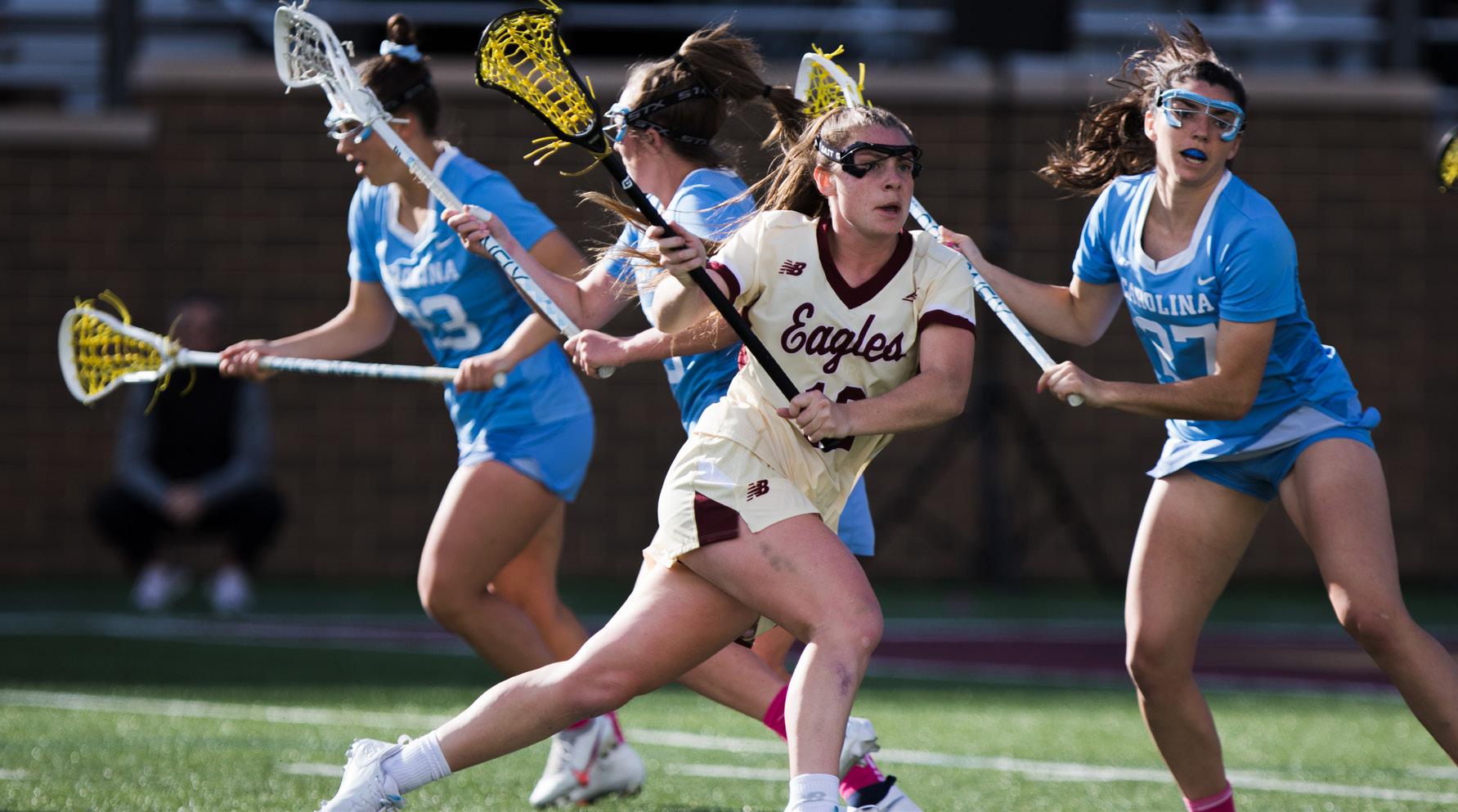
The Tar Heels entered the game with just two losses since 2019, both to BC—in the 2019 and 2021 NCAA Tournament semifinals.
From the first draw, it was clear that both teams were prepared to fight for the coveted No. 1 spot in the nation. The Eagles logged the first two goals of the game, but North Carolina quickly recovered with two of its own. The first quarter ended with the Eagles leading 4–3.
“We really, really understand how hard it is and how awful it is,” Sabina Roytman, a co-owner of the chain, said. “Every day, we take a look at the news, [and] we hope that freedom [for Ukrainians] is going to come and that people will be able to rebuild the country.”
For the owners, the decision to stop importing Russian products was neither morally nor financially difficult, Roytman said. Imported Russian goods, such as Russian Standard Vodka, accounted for only three to five percent of the chain’s stock, she said.
The chain also carries goods from other Eastern European countries as well as products made in the US by immigrants from former Soviet Union countries. But Roytman
said some customers have struggled to differentiate between these products and Russian products, often asking whether certain goods are Russian—which, since Feb. 28, they are not. Since the invasion, many consumers have made an increased effort to discern which products are Russian and which are not, aligning with national boycotts of Russian products.
“There was a huge wave of emigration … from all the [Soviet] republics and Russia in the ’80s and ’90s,” Roytman said. “This wave came into the US, and a lot of people have settled down in the New York area, and there are factories right now who are producing cold cuts or cheeses or whatever else using the old recipes. … [These products] have never been Russian.”
The BazaAr owners each came to the US as refugees from Soviet-era Moldova and Ukraine, according to Roytman.
Besides ceasing Russian imports, Roytman said the stores are also promoting Ukrainian foods such as borscht and potato dumplings.
Monday, March 21, 2022
Chestnut Hill, Mass.
www.bcheights.com
INSIDE THIS ISSUE ARTS........... OPINIONS.... SPORTS........ NEWS........... METRO........ FOOD.......... MAGAZINE.... A9 A12 A14 A2 A4 A6 A7 See Lacrosse, A14 INDEX Vol. CIV, No. 6 © 2022, The Heights, Inc.
Established
See BazaAr, A5 S portS See A9
www.bcheights.com
1919
NICOLE WEI / HEIGHTS STAFF
LEO WANG / HEIGHTS STAFF
Boston College Dance Ensemble took home the top prize.
Remembering BC Law Professor Catharine Wells
By Julia KiersznowsKi Projects Editor sofia laBoy Asst. News Editor and BeTh Verghese Asst. News Editor
Boston College Law School
Professor Catharine Wells, a pragmatism legal scholar who spearheaded efforts to diversify the BC Law community, died on March 7.
“As a law professor, she sort of transcended the law,” said Sam Jockel, a former student of Wells and BC Law ’14. “When I looked back at some of her writings, some of what she was talking about wasn’t just about law. It was sort of much higher than that. I always thought her more as a philosopher—one that inspired others and one that did make change.”
Ingrid Hillinger, a BC law professor, said she and Wells instantly clicked after meeting.
“She was basically three months older than I am, and because we’ve had very similar life experiences in terms of being a woman and teaching and so on,” she said. “We just automatically bonded.”
Hillinger said she often stayed at Wells’ home for the night—as Wells lived much closer to BC— and they would talk late into the night.
“I get up very early in the mornings when I teach,” she said. “So whenever I went to Catharine’s house because it was going to be bad weather, I always said, ‘We can only talk for “x” amount of time.’ And we would end up talking till 11 o’clock at night. And I remember those very, very fondly.”
Two of Wells’ defining attri -
butes were her incredible kindness and diplomacy skills, Hillinger said.
“I would often go to her to get advice on an issue that I wanted resolved and I wanted to know a diplomatic way to do it,” Hillinger said. “She reigned me in. She calmed me down. She had the right amount of ‘you’re right, you’re right, you’re right’ and ‘no, no, no, can’t do that.’”
James R. Repetti, BC Law’s inaugural William J. Kenealy, S.J., professor, echoed this sentiment, as Wells’ kindness always stuck with him, he said.
“Catharine showed us that just because you’re really intelligent doesn’t mean that you can’t be kind and generous,” he said.
According to Repetti, Wells exemplified the University’s Jesuit values through this attitude.
“[Her character] is consistent with the underlying Jesuit mission of seeing God in all people and seeing the goodness in all people,” he said. “Catharine always strove to do that. She always tried to see goodness in people and bring out the goodness in others.”
Patricia McCoy, BC Law’s inaugural Mutual Insurance professor of law, described Wells as brilliant.
“She was a renaissance woman in the sense that she was both a legal philosopher and she was a brilliant litigator, a brilliant lawyer,” McCoy said.
Repetti also said that Wells’ generosity and wisdom made her an excellent friend.
“She was a good friend,” he said. “If I ever needed help with something, she was always there to help. She always had sound advice. She was very wise. Great career advice. She really had so many
talents.”
According to McCoy, Wells mentored often overlooked students, giving advice and supporting them through their time at BC.
“ Professor Wells was known for taking students who otherwise might be overlooked under her wing and really cheering them on,” McCoy said. “She was one of the biggest champions of students imaginable.”
Jockel also emphasized Wells’ encouraging nature and her dedication to teaching.
“She loved the law, she loved teaching,” he said. “And that came through both in class and after hours in her office hours or having a coffee with her.”
Jockel was co-chair of Lambda Law Students Association, an LGBTQ+ coalition at BC Law, when it was vandalized in 2013. He said Wells was a much-needed mentor during that time.
“I was so distraught, I remember going straight to her office after I saw the vandalism,” Jockel said.
“She encouraged me to stay strong and to not lead with fear. … My relationship with her shifted, I saw her not just as a legal scholar, but a change agent who inspired others.”
Wells taught a variety of classes at BC Law, including courses on feminism and microagressions as well as a first-year torts class, Hililnger said.
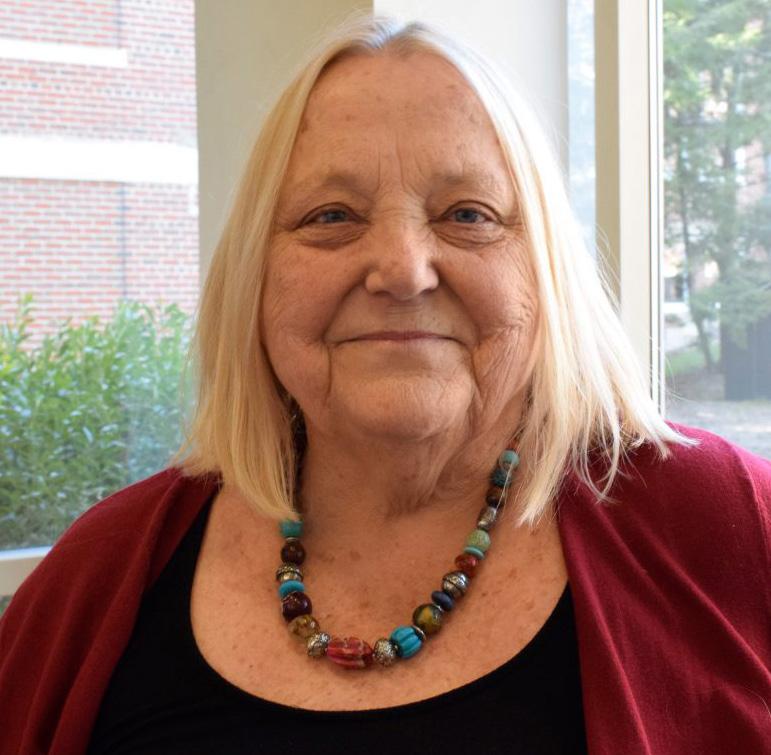
Jackel said Wells taught topics not frequently discussed in other law courses.
“I took a class with her on microaggressions, and I also took a class with her on American legal theory, both of which introduced me to feminist scholars and those writing about intersectioniality and
critical race theory that were often not highlighted in your typical civil procedures class,” he said.
Wells published articles on microaggressions, pragmatism, feminism, and other topics in the Harvard Law Review, Northwestern University Law Review, and several other peer-reviewed journals, according to BC’s website.
“She also wrote and taught about the importance of taking the time to learn from those whose experience is different from your own,” Jockel said. “And her writing pertaining to microaggressions reflect that.”
Professionally, Repetti said that Wells’ open-mindedness gave her the ability to understand and debate both sides of an argument.
“In law practice, [you] quite frequently are negotiating with the
other side if you’re trying to settle a case, and she was very generous in her praise of the other side, yet, at the same time, she was firm in her own position,” Repetti said.
According to Hillinger, Wells was constantly working to make BC Law a better institution.
“I would say she was sort of an elder statesman looking to make the school a better place, a more diverse place, a more inclusive place,” Hillinger said. “I think that’s what she was really trying to do.”
Repetti said he hopes BC remembers Wells as an excellent academic, professor, and all-around person.
“I think she’ll be remembered [at BC] as a great scholar and also as a wonderful teacher who had a major impact on the lives of our students,” Repetti said. n
Clark Talks Negative Media Portrayals in AADS Lecture
By gaBBy saVo Heights Staff
Meredith D. Clark, associate professor in the School of Journalism and Communication Studies at Northeastern University, said she
is curious about the negative media portrayals of African Americans.
“My curiosity is driven by the stories that people tell themselves and the stories that people tell to others,” Clark said.
Clark discussed the impacts of
negative media portrayals of African Americans and how through her research she tried to find solutions to these harmful images in the New Directions series, hosted by BC’s African and African Diaspora Studies Program on Wednesday.
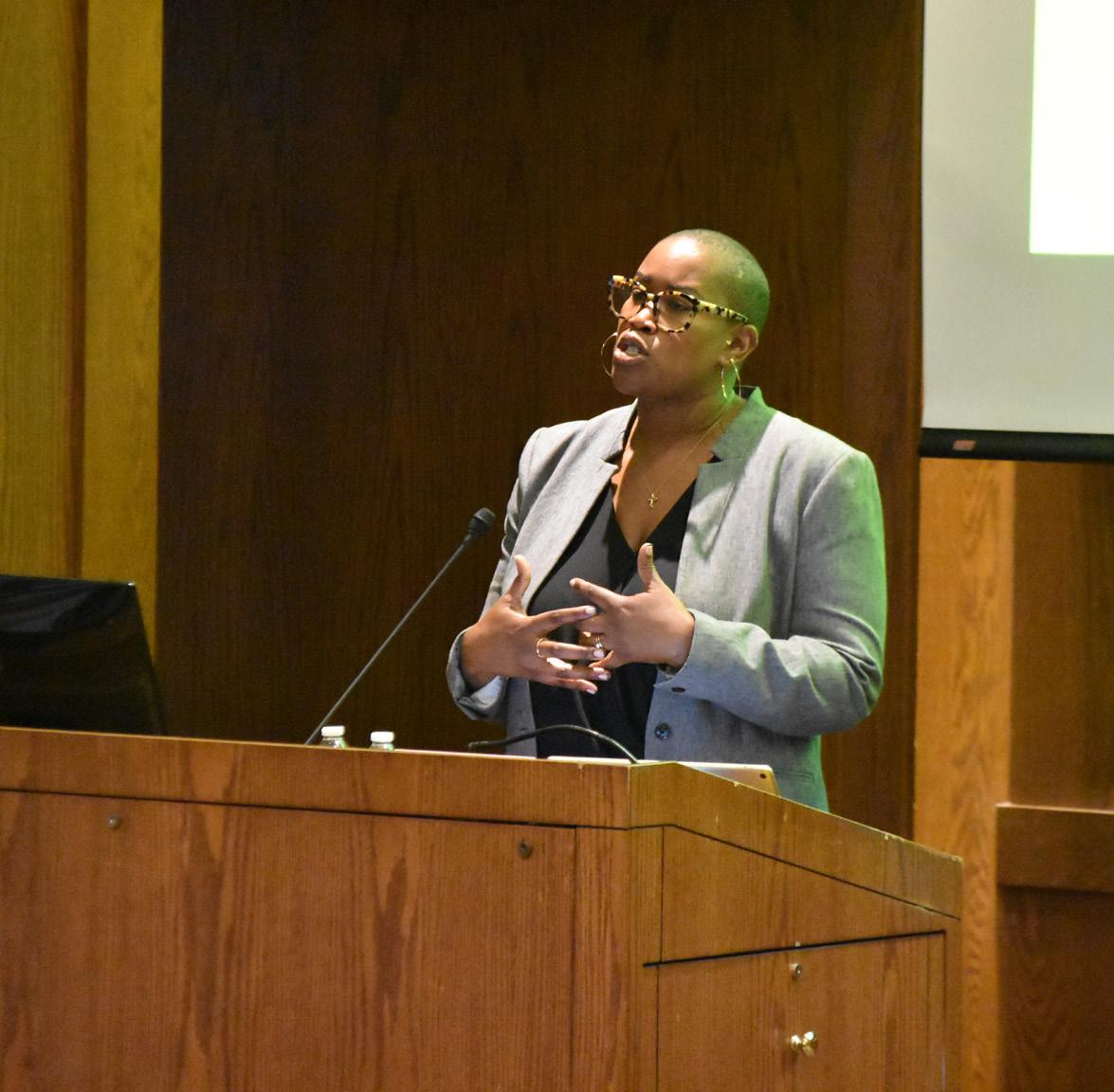
Clark grew up in the south, and as the child of an evangelical minister, spent most of her days in church.
Her parents, Clark said, were not fond of newspapers, explaining that they often contained negative representations of Black people. But, rather than simply accepting her parents’ beliefs, Clark said she wanted to look further into the matter for herself.
“Rather than accept their positioning against the newspaper, I decided to spend my time digging in to see what I could do about it,” she said.
In 2010, Clark, who was working in media at the time, said she came across an article that would become the focal point of her research.
“I came to a particular story one day on the last day of my initial newsroom career,” Clark said. “This was from August 10, 2010, and the
story is titled ‘How Black People Use Twitter.’”
The story, written by then-technology writer for Slate magazine Farhad Manjoo, bothered Clark, who said she disagreed with Manjoo’s framing of Black people on social networking sites.
The study of Black Twitter became the driving force of her research, Clark said.
“[In the book] I talk about the ways that Black people have built community on … Twitter and have used it to present counter narratives of the way our reality is told in mainstream news media,” Clark said.
While Black media portrayals prompted her research, the inspiration behind Clark’s academic framework was James Baldwin’s 1963 essay, which she said was crucial in providing a structure to discuss the African American experience.
“James Baldwin’s lecture is a critique of the social purpose of education and an exhortation to educators who struggle against the forces of oppression,” Clark said.
Clark said she used Baldwin’s three types of resistance as inspiration to address seven contentious
spirits that she identified, which work to dehumanize and demoralize African American people and contribute to white dominance.
“My seven are fatigue, lack of empathy, anti-intellectualism, division, codified anti-Blackness, plastic representation, and comfort and complacency,” she said.
In identifying and labeling these seven “demons,” Clark said she is able to recognize and potentially move past the challenges and adversity she faces.
“The scriptures talk about how, in order to cast out demons, you have to know the names of the demons,” said Clark. “You have to label the problems that you encounter.”
Clark said that in order to “cure” the inequality and hate circulating throughout the world, we need to stand up against it.
“It is up to us and our formal roles as teachers and students, and our less hierarchical understandings of one another as common learners, to be prepared to go for growth to attempt to correct so many generations of bad faith and cruelty in the classroom and society.” n
NEWS a2 Monday, March 21, 2022 The heighTs
Join a panel of Boston College faculty at 245 Beacon on Monday at 7 p.m. for a discussion on Ukraine’s past and present and the Russian invasion of Ukraine. There will be a Q&A session after the panel.
Listen to UGBC presidential and vice presidential candidates compete in a debate on diversity, equity, and inclusion on Thursday at 7 p.m. in Walsh 131.
Join CAB this Tuesday from 5 to 8 p.m. for indoor rock climbing at Rock Spot Climbing South Boston, located at 30 Old Colony Ave., Boston.
1 2 3
This Week’s Top 3 Events
IMAGE COURTESY OF BC LAW MAGAZINE
Wells was a legal pragmatism and feminist scholar who died on March 7.
MOLLY BRUNS / HEIGHTS STAFF
Meredith D. Clark spoke on negative portrayals of African Americans in the media.
Two Teams Launch Bids for UGBC Pres. And Vice Pres.
B y e rin s hannon News Editor
Two teams launched their bids for UGBC president and vice president Friday afternoon, kicking off a race that will end when students cast their ballots on April 5.
The candidates for president are Lubens Benjamin, chair of UGBC’s AHANA+ Leadership Council and CSOM ’23, and Kudzai Kapurura, this year’s Martin Luther King Jr. Scholarship recipient and MCAS ’23.
Their respective running mates are Julia Spagnola, chair of UGBC’s Academic Affairs Committee and MCAS ’23, and Lawrence Zhang, CAB’s assistant director for finance and live entertainment and MCAS ’23.
Benjamin and Spagnola announced their candidacy first at the election kick-off event hosted by the Elections Committee.
“Since my time at BC, I’ve really grown just because of the doors that this place has opened up to me,” Benjamin said during their announcement. “If I can make those doors more accessible to other students to open and enhance their experience, there’s nothing else I’d rather do.”
Spagnola emphasized the rela-
tionships she and Benjamin have formed with various campus offices and faculty members during their time in UGBC.
“Our policies are really intentional about not making these talking points with the same things that people come up here and say every year,” Spagnola said. “Because of our experience in the organization and working with each other and working with administrators, we also know what is not just practical but possible.”
Benjamin and Spagnola also detailed their four-point campaign platform, which includes diversity, equity, and inclusion, academic experience, student life, and institutional structures within UGBC.
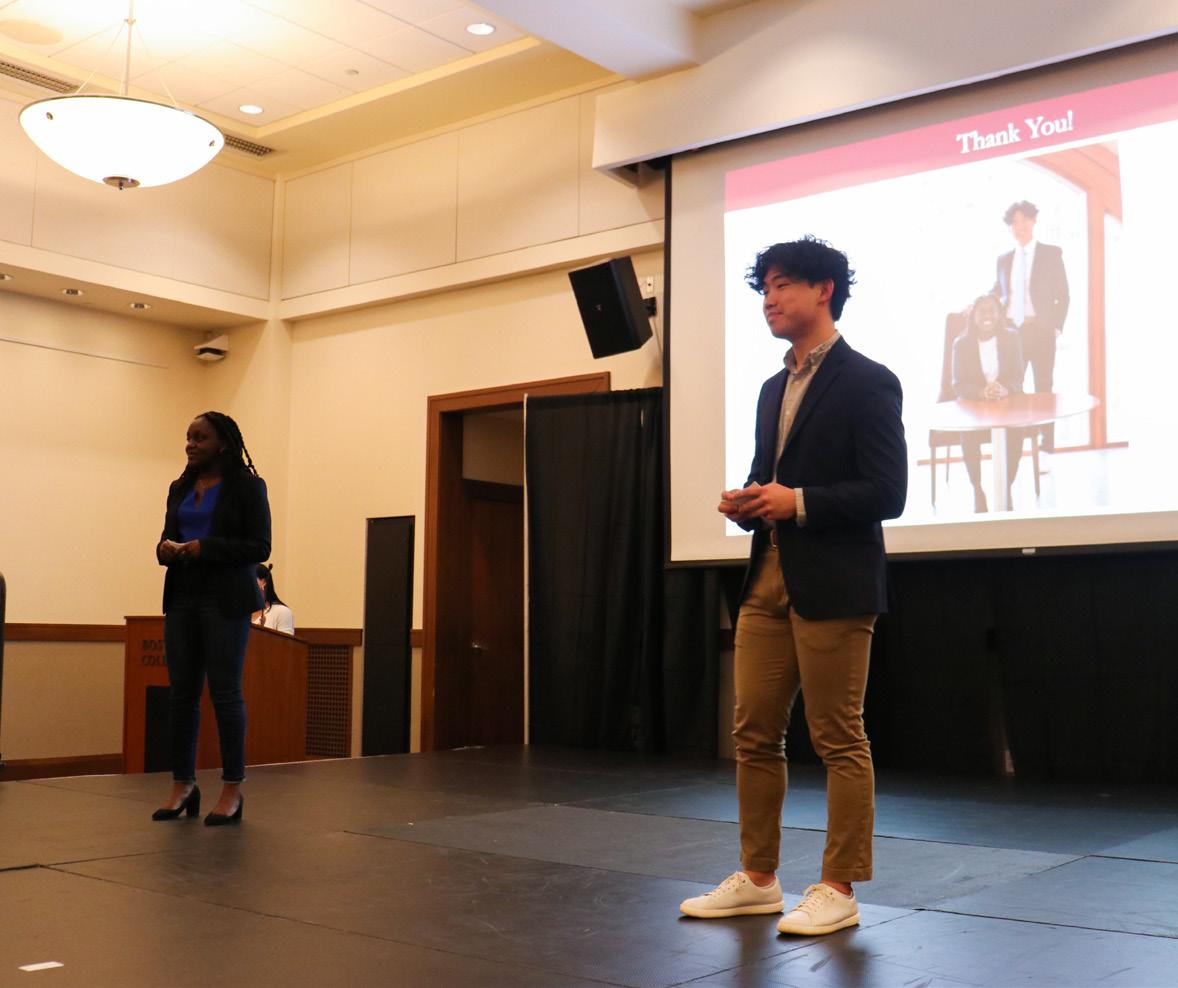
Some of their priorities include evaluating the student academic advising process, streamlining the bias- and hate-related violations reporting system, and taking shortterm steps to improve sustainability on campus.
“When it comes to environmental sustainability, we are very keen on having short-term goals and solutions while still working towards long-term goals, like divestment, as well,” Benjamin said.
Ultimately, Spagnola said their team is not focused solely on winning or losing, but on creating
change on campus.
“We want to lay the foundations that something greater is possible for future students at BC, and we promise that we’ll give you all we have,” Spagnola said.
After Benjamin and Spagnola’s speech, Kapurura announced her run for presidency and Zhang’s run for the vice presidency.
“We think that this is an opportunity to now serve a greater part of our student body and we are enthusiastic to take that opportunity up,” Kapurura said. “I couldn’t think of anyone better to do that with than Lawrence.”
Kapurura said she and Zhang are approaching UGBC from an outside perspective in an effort to incite change within the organization.
“We have no UGBC experience, which I think works better because we don’t have to worry about the complexity of bureaucracy and … we come in with a fresh perspective,” Kapurura said.
The team’s campaign platform outlined a wide range of goals— from diversity, equity, and inclusion to sustainability.
Some of their proposed changes include establishing a career development program within the Morrissey College of Arts and
Sciences, involving students in the hiring process for professors, and having a UGBC representative on Boston College’s Board of Trustees.
Zhang also cited recent problems with housing at BC as an issue the team plans to address.
“Not only this year, but in years past, BC housing has always been an issue, and we will work with Office of Residential Life and other departments like BC Information Technology to … ensure that the website capabilities next year are
up to date and that we have transparency around the process,” Zhang said.
According to Kapurura, she and Zhang are the best candidates because they have collected and heard so many student experiences.
“Leadership is not about what we want to do or what we think we can do, but it’s about thinking about what does our student body need and how can we best implement those needs through policy,” she said. n
Panelists Discuss Free Speech on BC’s Campus at BCAAUP Event
B y Isabel Sullivan Heights Staff
Boston College’s student culture is moving in a disturbing direction, according to R. Shep Melnick, the Thomas P. O’Neill, Jr. professor of American politics.
of the repercussions from their professors for contradicting them publicly,” O’Rourke said. “But there also seems to be powerful social dynamics going on between our students.”
$3 Million Grant Aids RPCA Trauma Study
trauma of war, according to Laura Bond.
“Free speech, which is a bedrock of liberal democracy, is under attack around the world on many fronts,” Melnick said.
The National Institute of Mental Health awarded Boston College’s Research Program on Children and Adversity (RPCA) a five-year, 3.3 million dollar grant that will advance the program’s research on the mental health effects of war on child soldiers in Sierra Leone, according to BC News.


“There aren’t many other [studies] that are like it in the world,” said Charles Currie, a firstyear doctoral student and research intern from Sierra Leone. “It’s very unique … so we’re really excited.”
After the end of the Sierra Leone Civil War in 2002, Theresa Betancourt—director of the RPCA and the Salem professor in global practice at BC’s School of Social Work—launched a study with the International Rescue Committee and a group of former child soldiers to observe the lasting
“We are now in the fifth wave of data collection,” said Bond, acting program manager of the study and second year doctoral student. “So every three to five years, we’ve been able to go back. Now people that were in their youth in the early 2000s, they’re in their 40s now, and so it’s been really interesting to follow them throughout their lives, introduce the same measures, and see growth over time.”
Currie said this grant will allow the researchers to observe not only the original cohort of child soldiers as adults but also their offspring, helping them determine whether or not there is a “biological transmission” of intergenerational trauma.
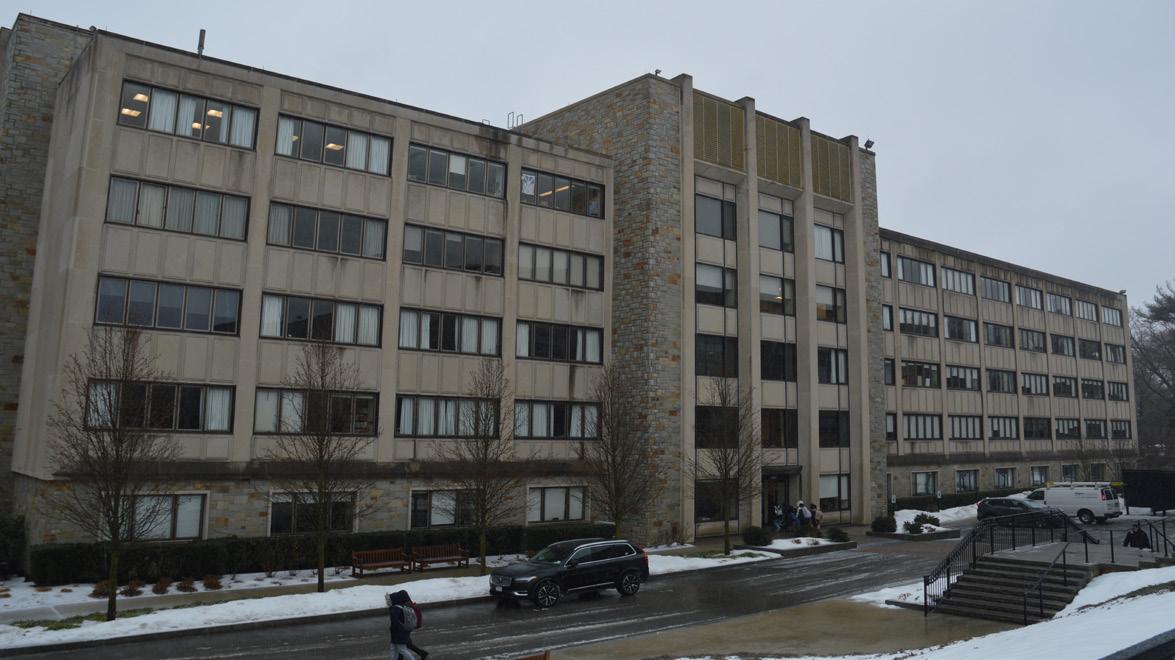
Read the rest of this story at www.bcheights.com
The BC chapter of the American Association of University Professors hosted a virtual forum, welcoming Melnick, Lindsey O’Rourke, Kent Greenfield, and Patricia Lowe to discuss academic freedom and campus speech on Tuesday evening.
According to O’Rourke, a professor in the political science department, free speech issues are generational.
“[Free speech] is clearly not a Boston College problem,” O’Rourke said. “It’s clearly a generational challenge facing higher education today, which isn’t terribly surprising when you think of the polarization of our politics combined with social media.”
O’Rourke explained that while there are free speech issues at many universities, BC scores marginally worse in terms of sample-wide averages. Last October, the Foundation for Individual Rights in Education released a report ranking BC 151 out of 159 college campuses in free speech.
“Part of it does seem to be fear
According to O’Rourke, the University’s representation of political identities is nearly identical to a sample of other colleges, demonstrating that this is not a bipartisan issue, but rather that these concerns are shared across the political spectrum.
“What is particularly discouraging is the decline of respect for free speech and free inquiry on college campuses,” Melnick said. “That’s the place that should be most revered and most protected.”
Greenfield, a BC Law professor, said he agrees with Melnick and believes universities should challenge students, faculty, and administrators to engage in civil debate where disagreements may arise.
“It’s not just about the tools of persuasion and understanding, it’s also building the inner strength of courage to be able to speak up in an uncomfortable moment,” Greenfield said.
O’Rourke and Melnick both said the culture of free speech at BC needs to be improved and advocated for the University to clearly affirm free speech on campus.
“Faculty, too, should lead by example,” Melnick said. “We have
lots of lectures on this campus, and I hope we have more debates.”
Lowe, BC’s associate vice president of the Office for Institutional Diversity and Title IX/ ADA coordinator, said embracing free speech while recognizing its harmful impacts is not mutually exclusive on BC’s campus.
“Free speech is also to recognize and ensure that we are educating ourselves ... and understanding, historically, what that free speech may entail,’’ Lowe said. “If that is not happening, we will then go into a space where we create barriers or invite potential biases.”
As free speech policies on college campuses evolve, Melnick said it is a concern that people will disregard legitimate political speech.
“There are rules about how you treat other people, employees, or students and proper rules about sexual or racial harassment,” Melnick said. “But I do think that we need to be careful that these [rules] not be expanded to such a way that they impinge on, what I would consider to be, legitimate, political speech.”
According to Lowe, it is important to cultivate “intercultural competence” through exposure to the beliefs and experiences of others in order to uphold free speech.
Read the rest of this story at www.bcheights.com
NEWS A3 Monday, March 21, 2022 The heighTs
ERIN SHANNON / NEWS EDITOR
B y Natalie Arndt
Newsletter Editor
BEN SCHULTZ / FOR THE HEIGHTS
Kudzai Kapurura and Lawrence Zhang presented their campaign platform.
Following Russian Invasion, Two Local Ukrainian Immigrants Face Growing Uncertainty, Challenges
By Victor Stefanescu Metro Editor
Editor’s Note: Dmitry does not want his name published online, an exception that was granted by The Heights . He has relatives in Russia, and said he fears what would happen to them if an article revealing his identity is traced back to the country.
D mitry and Aleksey Vyazovsky said they have had their day-to-day lives turned upside down since Feb. 24.
As two Ukrainian immigrants who left their home country and moved to the City of Newton seeking better lives, the Russian invasion of Ukraine has left them in a state of uncertainty.

Both have loved ones who are still in Ukraine, and Vyazovsky said he no longer feels safe even in Boston.
“But even—the interesting thing—even here, I’m not feeling safe now, just because of one crazy guy that has nukes in his power,” he said.
Dmitry first left Kyiv in 1991 before immigrating to Israel and then eventually to Newton.
Dmitry said that as a Jewish person under Soviet rule in 1991 he feared persecution and discrim
Crimea, where many in the Peninsula—invaded by Russia in 2014— are ethnically Russian.
“My parents were born both in Russia,” he said. “They came from Russia and they … associated themselves with Russia until now.”
According to Vyazovsky, before the most recent invasion, more Russian flags hung around Sevastopol than Ukrainian flags—since many on the peninsula supported Russia after they invested in housing throughout the area.
“They built houses [and] apartments for citizens there,” he said. “That strengthened the support of the population.”
Growing up, Vyazovsky said ethnic differences throughout the peninsula did not affect his childhood.
“It was just a normal childhood,” he said. “So nobody [cared if the region was] a part of Ukraine or Russia.”
Vyazovsky moved to Kyiv in 2014, where he said few supported Russia. In the city, he said he lived comfortably working in software development until he left the country in 2018.
He came to the United States looking to escape the rampant government corruption in Ukraine.
“I was looking … to live in a country where the law is respected,”
Dmitry said.
The war—according to both Dmitry and Vyazovsky—has really been going on since the 2014 Crimea invasion.
Since then, Vyazovsky said he has boycotted Russian products.
“In Ukraine, you could find, [at] the time, find some Russian goods,” he said. “And here as well, but I never bought them myself. That was just my personal sanctions.”
Before the Feb. 24 invasion—and before others in the U.S. and Europe joined Vyazovsky’s boycott—he said he hoped the tensions between the two countries would subside, as they had in the past.
“Russia always did the same [escalations] for eight years starting in 2014,” he said. “It always did the same before the start of negotiations to trade off some escalation to something favorable for them.”
Dmitry, who lived in the U.S. during the 2014 escalation, said that after moving to Boston, it took him time to find the Israeli community in the area.
Prior to this, he said he only knew his family and the few friends who immigrated with him.
As the tensions increased over recent years, Dmitry said he believed that a full-scale invasion of
“When I just landed, I checked the news and I realized … that the war began,” he said. “I was really deeply shocked. And I … started to tremble because I was so nervous.”
After the invasion, Dmitry said he was worried the Russian military would soon besiege Ukrainian cities.
“I was afraid that the Russian forces can actually enter major cities in a few hours or days,” he said. “And it was real fear, that it will happen.”
Now, Vyazovsky said prevalent thoughts about the war are still occupying his mind, affecting his concentration.
“It’s hard for me to do some normal, regular work [and] to focus on my work,” he said. “[The war] distracts so heavily—just checking the news hourly and thinking about the relatives there and friends there.”
Both Dmitry and Vyazovsky attended recent rallies in Boston supporting Ukraine.
“Some of my former colleagues joined [and a] former customer joined [the rally],” Vyazovsky said. “I know that people around [Boston] try to support somehow.”
He said rallies are an important way to spread awareness about the war to those with the power to do
evacuate loved ones out of Kyiv, providing monetary support and information about the state of the country and the rest of Europe.
Life is not normal in the city right now, Dmitry said, but he is still able talk to his friends and family on a regular basis.
“I have friends [who]currently we are trying [to] … get them out,” he said. “[It’s] still difficult for many reasons.”
According to Dmitry, bringing loved ones to the U.S. is close to impossible right now, and it is even difficult to move them elsewhere in Europe.
“European countries, they’re already overloaded,” he said. “The world, not just [Europe], was not ready for this situation where you have three million refugees in the middle of Europe.”
Vyazovsky also still has loved ones in the country.
His brother and brother-in-law settled in Western Ukraine after fleeing shellings in Kyiv, he said.
“My close friends and family [and] extended family [are] there,” Vyazovsky said. “They are safe now.”
Dmitry and Vyazovsky both said they hope the war leads to the collapse of the Russian state.
“Our mission—Ukraine’s mission—is just to fight for [its] own life and independence,” Vyazovsky said. “But eventually, I think it will
Dmitry also said he hopes to see Western nations place tougher
“We, as the United States government and EU, should ban all exports to Russia, including food and medicine,” he said. “It means complete blockade … I mean everything … except insulin and cancer
But overall, Vyazovsky said he just wants the war to remain rele -
“I think that’s important, to keep that on the news because … next week, or next month, [something else might happen], and just, it will just go away without some positive outcome for Ukraine,” he said. “I think we need to use this moment to just talk about that as much as possible—to explain to people that it affects not only Ukraine, it affects the entire world.” n
METRO A4 Monday, March 21, 2022 The heighTs
GRAPHIC BY ANNIE CORRIGAN / HEIGHTS EDITOR
Local Businesses and Residents Respond to War in Ukraine
BazaAr, from A1
The chain, however, foresees difficulties securing future products from Ukraine due to the invasion, she said. The supermarket imports its Ukrainian goods through local wholesalers, who Roytman said the war will likely affect.
“It’s actually very sad that for a certain amount of time, we’re not gonna be able, you know, to offer [more Ukrainian goods],” Roytman said. “We hope that Ukraine wins in this war … and then the products [are] going to come again.”
Aside from refusing Russian imports, the chain has made monetary donations to Ukraine and helped the family members of BazaAr workers escape Ukraine, Roytman said.
ple of Eastern European origins, including individuals from both Russian and Ukrainian. Roytman said Russian and Ukrainian staffers continue to get along perfectly fine in the stores, despite stereotypical assumptions that Russian Americans are pro-Kremlin.
Roytman further condemned the rise of stereotypes against Russian Americans, drawing comparisons to the rise of anti-Chinese sentiment during the COVID-19 pandemic.
“This right now, [this] reminds me of … [when] COVID started,” Roytman said. “Everywhere in the media they told us ‘don’t go to Chinatown,’ or ‘don’t buy Chinese food.’ I personally hated it.”
By Connor Siemien Asst. Metro Editor
Moved by the devastating images of Russia’s invasion of Ukraine, Newton resident Rebecca Ferguson put her baking hobby to work.
Ferguson is encouraging donations to Save the Children, a global humanitarian organization, in
exchange for her homemade yellow and blue macarons. The response has been overwhelming, she said.

“My fundraising goal was originally $600, but I think [the total is] going to be closer to $1,000,” Ferguson said.
After looking at various social media posts, Ferguson found the Save the Children’s Ukraine Fund,
in Ukraine in 2014 in response to Russian aggression in the eastern part of the country. The funds from Ferguson’s baked goods go toward serving child refugees in Ukraine.
began its
Read the rest of this story at www.bcheights.com
“We also have some staff members whose families are struggling right now,” she said. “So we helped them. Some of them we helped, you know, using our connections, and some of them were able to cross the border and they are in Moldova right now.”
The chain employs many peo
Roytman said that the owners and many staff members of BazaAr said they stand in unity in support of Ukraine.
“Until the war started, we didn’t even know who was Russian and who was Ukrainian because we were all international,” she said. “We
Read the rest of this story at www.bcheights.com
Newton Public Schools Face Potential Job Cuts
By Sahithi thumuluri Heights Staff
David Fleishman, superintendent of Newton Public Schools (NPS), warned the NPS community at a March 8 budget presentation that the district may cut as many as 74 jobs next year as a result of declining enrollment rates and a budget gap.
The district’s 2022 budget, though, increased by nearly $9 million from 2021.
“There has got to be some issue here. How does Newton of all places not have money?” said one Newton community member during a Newton Teachers Association (NTA) Parent-Educator Collaborative meeting hosted Thursday night on Zoom.
NPS’s budget increased by $8.9 million from 2021, according to
Mayor Ruthanne Fuller’s March 10 newsletter update. Additionally, the school system received $14 million of Newton’s American Rescue Plan Act (ARPA) allocation and $6.3 million from the Coronavirus Aid, Relief, and Economic Security Act (CARES), according to the update.
Despite the budget increase for 2022 and federal funds, NPS’s proposed 2023 budget exceeds the available funds by $5.2 million, according to Fuller’s update.
Fleishman predicted that the imbalance could cause the loss of approximately 50 to 60 staff members and potentially 12 to 14 through layoffs.
“Newton Public Schools will continue striving to provide strong academic and social-emotional support to students and keep class sizes reasonable,” Fleishman said. “But the
budget was developed with very little cushion, relying on surpluses and aggressive assumptions to balance.”
Fuller said at the meeting that much of the district’s capital has been invested in creating a safer school environment, as well as facility improvements and maintenance, and the final payments of the EDCO Collaborative program for deaf students.
Factors such as increased substitute staffing costs, unanticipated COVID-19 costs, and declines in building rental revenues created the deficit, according to slides Fuller used in the meeting.
Even with an essential purchasing freeze implemented in January, it is likely that federal COVID-19 funding through the Elementary and Secondary Education Emergency Relief III will be needed to end the year with a balanced budget, according
to Fleishman.
“88% of the budget is personnel costs. In 2017, that number was 86%. As a result, the reductions need to be primarily personnel due to fixed costs in non-personnel areas,” wrote Fuller in her update. “We cannot use one time [ARPA] funding to close this budget gap, because that’s just kicking the can down the road.”
This news has left Newton teachers, parents, and community members concerned for the students and their education.
Teachers at the Thursday meeting said they are worried about finding time to give each student the attention they need if class sizes increase.
A social worker for the district said she is concerned about the impacts of the budget cuts on students’ social and emotional health.
“Tapped-out and burnt-out staff
are not going to provide what our kids need, and that’s what layoffs are going to give us,” she said. “Why must our students be asked to be the most resilient people?”
When asked for potential alternatives, Michael Zilles, president of the NTA, had a simple answer.
“Use the American Rescue Plan Act to get us through this hump,” Zilles said.
Zilles said he believes the mayor can allocate some of the $34.7 million the city has left in ARPA funds to close the budget gap.
A parent at the meeting called for transparency from the district.
“We don’t want to keep throwing money at the problem if it’s inefficiency,” the parent said.
Fuller will outline her final proposal during the budget address to the City Council on April 19. n
Residents React to Changing Pandemic Environment
By ViCtor StefaneSCu Metro Editor
For the second week in a row, the City of Newton has reported fewer than 100 cases of COVID-19.
Laurette Bachman, a Newton resident, said she feels safer following the recent decline in cases.
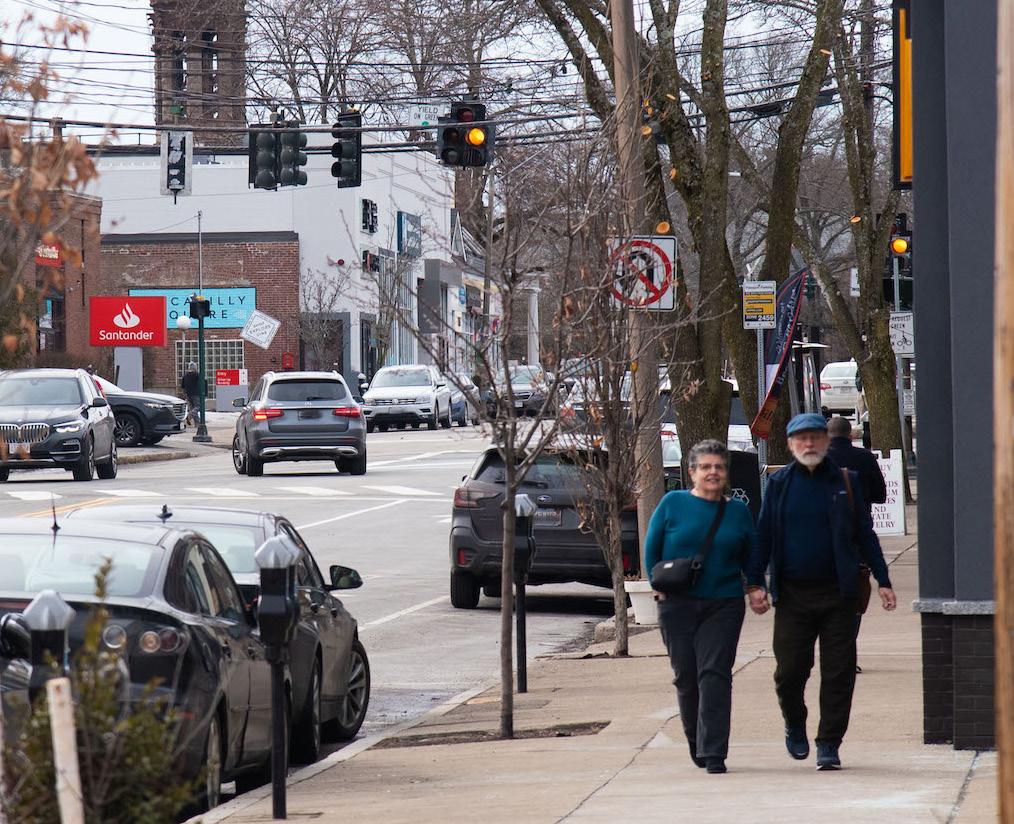
“I’m older,” Bachman said. “And I think that this is a community that really cares about each other. So despite different political views and misinformation, I think people have respected keeping each other safe.”
Newton reported only 74 confirmed cases of COVID-19 from March 10 to 16, according to Mayor Ruthanne Fuller’s weekly update. Thirty-six percent of those cases came from one of Newton’s institu-
tions of higher education, according to the update, though Fuller did not specify which one.
In comparison, the city reported 275 confirmed cases on Jan. 3 alone, according to the city’s COVID-19 Dashboard.
The city dropped its mask mandate in public spaces effective Feb. 18. Then, on March 8, Newton Public Schools made masks optional for students and staff. Despite the loosened restrictions, Bachman said she thinks more people wear masks in Newton than in other places in the country.
“We just came back from a trip in Florida where COVID doesn’t exist in Florida, and, you know, at least on the airplane, people did wear their masks—and it’s a pain in the neck,” Bachman said.
Kathy Dupre, another Newton resident, said fewer people are wearing masks in Newton compared to a month ago.
“Here, about half of the people mask now, which is pretty low compared to like a month ago,” Dupre said. “Other places, the same. … It’s definitely reducing, I would say.”



Now, Dupre said she hopes to see more people be comfortable without wearing masks.
“It’s a different social experience when you have to mask all the time,” Dupre said. “Personally, I use a lot of facial expressions when I communicate. And obviously I can’t do that if
Read the rest of this story at www.bcheights.com
METRO A5 Monday, March 21, 2022 The heighTs
which
work
IMAGE COURTESY OF REBECCA FERGUSON
A Newton resident fundraised for Ukrainian kids through baked treats.
A local grocery chain banned Russian products.
NICOLE VAGRA / HEIGHTS EDITOR
One Newton resident said fewer people are wearing masks compared to a month ago.
Ferguson encouraged donations to Save the Children, a global humanitarian organization, in exchange for her macarons.
Rozzi
By Shruthi Sriram Heights Staff
Over 18 inches of snow buried Chestnut Hill during a blizzard on Jan. 26, but that didn’t stop a Commonwealth Ave. pizza parlor from opening its doors.
Ernest “Ernie” Rozzi, owner of Crazy Dough’s Pizza, which sits feet from the Boston-Newton city line and across from Boston College’s campus, worked from 5 a.m on Jan. 26 until 1 a.m. the next morning serving pizzas to about 250 BC students.
“It was amazing,” said Rozzi. “I just—phones are ringing off the hook. The app was going nuts. And at one time I had over 35 orders. I couldn’t have made that deal. I was that far behind.”
Whether through blizzards, the heat of studentless summer months, or a global pandemic, Crazy Dough’s has continued to serve its surrounding community through its hearty pizzas, pastas, and calzones. And Rozzi, at the helm since 2015, runs the shop.
Rozzi was born and raised in Lawrence, Mass., and his journey to becoming the owner of Crazy Dough’s was far from linear. He held a variety of jobs throughout his childhood, both in and out of the food industry.
Rozzi grew up working at his dad’s music store during the summers. He would sit at the register and keep up the books.
Although music did not end up being his career of choice, Rozzi said the job connected him to customer service.
“Just that environment of seeing people everyday—I enjoyed helping people,” Rozzi said. “I enjoyed seeing people smile and laugh. You know, when I helped them, or didn’t help them, I always want to find out how I can open up, to help them have a better experience.”
Rozzi’s first job out of his dad’s store was in a pizzeria at age 15. As a busboy, he learned the behind-thescenes operations of what it takes to run a pizza shop.
“I went to this little local pizza store when I was little, and I bought a nice slice of pizza,” said Rozzi. “And so I worked there, my first job. I wanted to do everything. I loved everything about it, from making pizza, making sauce, and watching the restaurant be run.”
From that job, he moved on to
working at a Domino’s Pizza store at age 21 and eventually became the store’s manager. Then, at 26, he decided he wanted to franchise his own Domino’s branch. Rozzi walked into a meeting with his dad and his boss and asked to run his own store. But his boss had different plans.
“[My boss said,] ‘Well, we don’t think that your son is ready,’” Rozzi said. “‘But your son’s ready to be a district manager of my 11 Domino’s instead, but we’re not going to give him his own Domino’s.’ So my father asks him, ‘What does this pay?’ He wanted me to run his 11 Dominos for
come to keep whatever I have here.’”
On a cloudy afternoon in early March, Rozzi spoke about the early mornings and long days he spent keeping Crazy Dough’s afloat. Sitting at a round table near the restaurant’s expansive street-facing windows, his eyes welled up with tears.
Rozzi said he and his family would wake up as early as 4 a.m. to help him deliver pizzas in five different cities across Greater Boston, as well as fulfill orders for various school lunch programs.
He attributes his biggest influence to his late uncle, Mike.
welcoming.
“It’s fun for the kids to visit, unlike these dreary places that you go in, and there’s, you know, one guy working by himself,” Melissa Rozzi said. “It’s just, you know, kind of just like a light, nice, little environment.”
Rozzi’s commitment to serving the BC community was especially apparent during the blizzard this year. After hearing that dining services may not be open, and worried that the school would not be able to handle the influx of BC students, Rozzi made a commitment to keeping Crazy Dough’s open. Using Herrd and Facebook to spread the word, he single handedly manned the shop for 20 hours.
“I look at it almost like a partnership, even though we’re not partners with BC,” Rozzi said. “I can help them out. I know they’re short staffed in the cafeteria. I’m sure there was no way they could have 10,000 kids waiting for food.
Crazy Dough’s late-night initiative on Fridays and Saturdays has also helped create community at the restaurant, according to Melissa Rozzi. She said that she enjoys seeing students stop by either between parties or after the night is over to grab a slice.


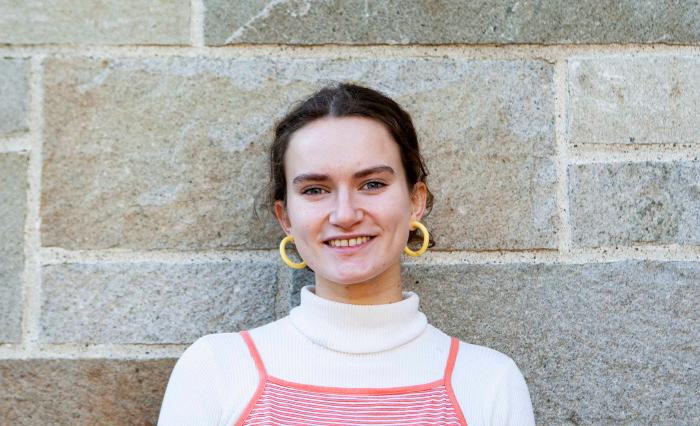
Students are thankful for the restaurant’s extended hours.
Classic Gin and Tonic
Look up “Boston College” in a dictionary, and under synonyms, you’ll find Rubinoff, “Rubi,” vodka. Those stale, cheap alcohols defined my first two years of college—I’d never ventured past variations of the vodka soda. It wasn’t until March of 2020, at the beginning of quarantine, that I began to explore how fun cocktail making could be. Upon arriving home, I found myself not only with an abundance of time, but with a full house. My family and I spent evenings crowded around our dining room table, and food and drink became an enriched love language. My mom and I especially bonded over picking out recipes for cocktails and dinner. Once we created the menu, we embarked on our once-a-day outing to first, the grocery store and second, the liquor store.
The first cocktail of this series is a simple one—the classic gin and tonic.
The best part of this age-old cocktail is that you can use whatever brand of gin and whatever brand of tonic water you want. Since this drink has such simple ingredients, I do recommend splurging on a nicer gin and a nicer tonic. Having good quality of both makes a difference, but at the end of the day, a G&T is a simple and delicious drink that is always a crowd pleaser.
For the gin, if you’re looking for something on the nicer side, ask for Brockmans, Hendrick’s, or Drumshanbo. If you’d like a classic brand that you might have heard of before, check out Bombay Sapphire or Aviation.
$9.25 an hour in 1996.”
Knowing his own worth, Rozzi said, he and his dad walked out of the store and decided to look for better opportunities. Four of the 11 Domino’s locations went on to close, according to Rozzi.
“They went out of business,” said Rozzi. “It’s all about karma, you know, and timing and everything like that.”
At 26, Rozzi opened up Bravo, his very first pizza store in Lawrence, Mass. The store was successful, he said, but he and his wife, Melissa Santucci Rozzi, knew they wanted to expand their reach to Boston. They were cautious, however, as they realized the city would prove to have more competition than they were used to.
Looking around Boston for the right opportunity, Rozzi and his wife ended up speaking to the owner of Crazy Dough’s in 2015, explaining that they were interested in purchasing the branch in Brighton and hopefully expanding it down the line.

“I pitched to the gentleman,” said Rozzi. “I’m like, ‘Me and my wife will go forward with what you have here, and we’re gonna expand it.’ He’s like, ‘Oh I’m done. You’re more than wel-
“My Uncle Mike was huge in my life—he allowed me to be an owner and make mistakes,” said Rozzi. “Because at 26, I really was not as polished as I wanted to be. We would cut 500 pizzas a day. I would look over at him at like, six in the morning. I could see him with a pizza cutter in his hand, up against a table, passed out.”
Since becoming owners of the store, Rozzi and his wife knew they wanted to be a lot more connected to the BC community, serving sports teams and students during games. They began collaborating with BC Athletics in the last couple years, he said, sponsoring the hockey and baseball teams during the pandemic.
“Everything in connection to BC has been my wife and myself: us wanting to be involved with the community, getting to know every customer that walks in the door, you know, knowing their name,” Rozzi said.
Melissa Rozzi especially wanted to create an environment in the store conducive to enabling BC students to spend time with one another. She decided to paint the store bright green and include patio seating in the summer to make the space more
“It’s a great spot, especially coming back from a night in Boston with my friends on the T,” John Soroka, CSOM ’25, said. “It’s right there, it’s a very convenient location, and they serve great food.
Rozzi said the pandemic has been difficult for his family and business, but through it all, he stayed connected to the BC community. He said he kept reminding himself that the students were struggling during this time too.
“We all went through it together,” Rozzi said.
Rozzi said he hopes to expand his store. He is proud of how far his business has journeyed, but more than anything, he is grateful to the community.
“You guys come into the store chanting, like ‘support local businesses, support local businesses, support local businesses,’” said Rozzi. “It is really touching, and I really appreciate that. This is how we live, you know, day by day. We don’t live extravagant lifestyles. We just support ourselves, and I do what I do for love.” n
Some more affordable options include Tanqueray (a personal favorite of mine), Beefeater, and New Amsterdam. For the tonic water, you can’t go wrong with a bottle of Schweppes or Canada Dry. Other options include Fever-Tree tonic water or Q Mixers tonic water, which has my vote.
For this recipe in particular, I used Empress 1908 Gin and Fever-Tree Elderflower tonic water. This is an incredibly fun twist on this classic cocktail—Empress is infused with butterfly pea blossom, which makes the liquor an indigo blue. When you add citrus or tonic, it turns purple or pink—an impressive party trick.
Gin and
2 oz. gin (your choice) 4 oz. tonic
Juice of
lime Optional garnish:
wedge
a tall
ice.
measured
Stir
DRINK:
Tonic INGREDIENTS:
(your choice)
half a
lime
INSTRUCTIONS: Fill
glass with
Pour in the
gin, then the measured tonic water. Stir, then squeeze in the lime juice.
again, then garnish with lime wedge.
A6 Monday, March 21, 2022 the heightS
ON THE
and Crazy Dough’s Pizza Serves the Boston Community When Nobody Else Can
MENU
to expand his reach into Boston, Rozzi acquired Crazy Dough’s in 2015. VIKRUM SINGH / HEIGHTS EDITOR
Maeve Reilly
Seeking
AGAZINE
Eagles Take to the Skies: BC Study Abroad Returns
 By Stephen Bradley Magazine Editor MC Claverie Assoc. Magazine Editor and erin Flaherty Asst. Magazine Editor
By Stephen Bradley Magazine Editor MC Claverie Assoc. Magazine Editor and erin Flaherty Asst. Magazine Editor
In the fall of 2021, many Boston College students grabbed their passports, packed their bags, and boarded international flights. A year and a half after a series of cancellations, study abroad had returned.

A Series of Cancellations
On March 12, 2020, BC’s Office of International Programs—now titled the Office of Global Education (OGE)—informed all students who were studying abroad that they must return home due to the onset of the COVID-19 pandemic.

Larry Pickener, the director of OGE, said March 2020 is the biggest challenge he has faced in his time at BC.
“It was very stressful,” Pickener said. “Figuring things out as you went even, you know, we had a lot of protocols and procedures in place overall regarding health and safety, but you know, each day was a challenge.”
Prior to March 2020, BC slowly canceled some programs in Asia, Pickener said, but it was not until COVID-19 hit Italy, due to the vast number of students studying there, that it became a larger obstacle for OGE to tackle, he said.
Pickener said OGE had to get about 450 students back to the U.S. while air ports were shutting down and the cost of flights was quickly rising. Yet, Pickener is proud of the work his office did in successfully getting students back home.
“I think our office did a herculean job to basically help get students home in terms of some reimbursements for ev erything and then working with universities where we could for finishing out the semesters remotely like they did here at BC,” he said.
In summer 2021, OGE was finally given the green light to start sending students abroad again for the 2021 fall semester. Pickener said that with more university partners abroad starting to open their borders and welcoming international students, OGE felt comfortable
through a program run by the European Center for the Study of War and Peace. Coming into BC, Fitzgerald said she knew she would study abroad.
“I’ve always enjoyed international travel, and I thought studying would add such a cool extra dimension to that, ” Fitzgerald said.
Since the Class of 2023 experienced the majority of its freshman year, Fitzgerald said she was less concerned about missing BC traditions and more with being away from her friends for a whole semester.
“I had a normal freshman year for the most part,” Fitzgerald said. “I had a full experience with football and things like that. I was definitely nervous to miss out on a semester of bonding and maybe have trouble making friendships, but that ended up not being a problem for me.”
Fitzgerald said she was anxious about contracting COVID-19 before arriving in Croatia, but her worries settled down once she arrived.
“Obviously, I was very nervous I was gonna test positive like a week before and just not be able to go at the beginning,” she said. “But once I left, I didn’t feel very nervous about it, and it wasn’t like my biggest worry.”
While many students visit various foreign countries during their time
times, I’m just going to go and do my own thing—there’s no other time to do it other than now,’” she said.
This semester, Sarah West, CSON ’23, is studying abroad in Quito, Ecuador, with the BC Seeing Quito program at the Universidad San Francisco de Quito. As a nursing student, West said that she was excited to be able to study abroad, as many under graduate nursing programs inhibit students’ ability to do so.
“One of the big reasons I came to BC was because I could study abroad as a nurs ing major, which is not very common in a lot of colleges,” West said.
West said she felt strange leaving campus just as things started to return back to normal, but she still decided to go abroad, hoping to make equally valuable memories in Quito.
“I’m so glad I am abroad because it’s equally … an adventure to the one I would be having in Boston,” West said.
Some students who were planning to go abroad this year never made it, as some programs were still canceled.
said.
“I was like, ‘The first semester is already a little wonky, might as well just stay to get a fuller college experience,’” she said.
Molly Harrison, MCAS ’23, planned on studying in Germany during the Spring 2022 semester—until Germany cracked down on travel restrictions a few months before her departure, she said.
Harrison said the amusement that comes with being abroad is what initially drew her to apply.
I think everyone has that fantasy of going abroad and living your best life and having a wonderful Instagram that we’re all seeing right now,” she said.
Harrison was accepted to apply to the American Junior Year (AJY) program at Heidelberg University—an external program in Germany—for the Spring 2022 semester. When a BC student applies to an external program, Harrison said, BC first approves the student to apply to the university abroad.
“BC approves your original application saying, ‘You’re a strong enough candidate,’” she said. “‘You can apply to this program and see whether you get in. … We’re supporting you. We’re sponsoring you.’”


Harrison said she sent her application to Heidelberg in October 2021, and by Oct. 21, AJY canceled its program after Germany’s updated COVID-19 travel restrictions.
silver lining of her situation is that this year is her first full academic year on campus.
“It is nice because this is my first full year at BC,” she said. “Last year, I … went home [from] Thanksgiving to the spring semester, so it’s my first official real BC year with all activities and everything, and I’m excited to be here. I have a double major now and a minor, so academically speaking, I was able to add more, which is exciting. But yeah, I mean, I probably would have had more fun abroad running amok.”
To compensate for the lost experience, Harrison said she plans on applying to a Fulbright Scholarship, which, if awarded, would grant her a stipend to teach English to students in Germany.
Other juniors, however, had abroad options that were running but ultimately decided not to go, such as Maddy McGrath, MCAS ’23. After her first choice of program in Paris was canceled, McGrath said that she reconsidered studying abroad.

“I still had a program in Paris,” McGrath said. “It was still the spring semester and still would have been a great experience, but I think primarily what drove me not to go was knowing that it wasn’t going to be exactly what I wanted considering how much time I have missed on campus. I wanted to just be here. Boston College is my favorite place in the world.”
The Initial Impact
kind of traveled around Croatia and had a great time.”
Haley Carey, an international studies major and MCAS ’23, said she always planned on studying abroad, as international studies majors are strongly recommended to study abroad. Carey went to Paris during the fall semester, through the BC in Paris program, and stayed with a host family while taking classes at École Supérieure de Commerce de Paris,
program had been canceled.
“I got a second email that was like, ‘Just to let you know, due to COVID, all programs in Australia have been canceled for both the fall and spring semester next year,’” Dufault said.
While Dufault said OGE offered to help her find another program, since she originally wanted to go abroad during the spring semester as opposed to the fall semester, she did not end up re-applying
“Heidelberg canceled its program, and BC’s response was like, ‘Shit, [you’re] out of luck,’” she said.
By that point, Harrison said, it was too late to apply to other spring semester programs.
Though the unfortunate news was upsetting to Harrison, she said she had somewhat expected the program’s cancellation—as COVID-19 cases had in-
In early 2020, Daniel Packard, MCAS ’22, applied and was accepted to attend Maynooth University in Ireland for Spring 2021. After abroad programs were canceled for the 2020 fall semester, Packard said OGE told students planning on going abroad in the following spring that they would keep the possibility of running the programs up in the air. On Oct. 26, 2020, OGE canceled all Spring 2021 abroad programs.
“I was waiting for the email all of last year,” Packard said. “I knew it was coming. I don’t think it was BC’s fault for making that decision. I think they had to make that decision. I don’t think they made the wrong one. … [But] I feel like cheated, almost, out of a thing that I came into school knowing I wanted to do. … I feel like [we’re] the one grade that got perfectly cheated out of this experience that is such a big part of college.”
A7 Monday, March 21, 2022 The heighTs
M
See Abroad, A8
As an alternative option, OGE offered students with canceled spring 2021 programs priority in the application process for fall 2021. Since this would have cut into Packard’s senior year, he said he did not see the appeal in opting to go abroad in the fall.
“I knew that was something I didn’t want to do,” he said. “I didn’t want to. After giving up a semester to COVID sophomore year and then pretty much all of last year—like last year was really weird—I knew I didn’t want to go and give away a semester of senior year so they offered that, but I never considered it.”
Making up for the missed abroad experience, Packard said he and his friends plan to travel around Europe for a few weeks after graduation.
“I don’t think I’m ever gonna go live in Europe for an extended period, or like a four-month period,” he said. “Me and my friends are gonna go travel, probably for a max of three weeks, but even that’s different. That’s like we’re gonna be hopping around Europe. We won’t be in one place and really get … immersed into a community, which I think I definitely would have had the opportunity to do [if abroad].”
Should I Stay or Should I Go?
As the application deadline approached for studying abroad during the 2022–23 academic year, many members of the Class of 2024 began to question whether or not they would study abroad.



Some current sophomores stuck to their previous decision to go abroad, while others struggled with leaving BC behind for a semester after an unconventional freshman year.
Brian Lynch, MCAS ’24, said his main motivation behind studying abroad is to explore the world.
Lynch, who will be in Venice, Italy, said that his biggest worry about going abroad is missing his friends at BC.
“They’ll definitely be some friends I won’t see all school year, just because they’re going in the spring,” he said. “But I mean, as of right now, [I have] no fear of being away from home.”
Grace Marshall, CSOM ’24, is studying abroad in Paris during the Spring 2023 semester but said she did not care which semester she went abroad—because her priority was being in Paris.
“I didn’t really mind whichever semester because my priority was going to Paris, but a lot of my friends that also wanted to study abroad were thinking about doing spring, and so … that was
in the fall for football season, but that wasn’t a priority. I think there’s trade-offs and stuff for both semesters.”
While Marshall expressed that she is a bit nervous for the fall semester without many of her friends on campus, she is not worried about missing BC too much while in Paris.
“I don’t know if I’m going to have too much FOMO when I’m abroad in the spring because I think I’m just gonna be so happy and living in the moment,” she said. “I’m sure maybe when Marathon Monday rolls around or Beanpot or stuff like that, I’ll probably feel like I miss that … but I’ll be so happy to be in France.”
For Marshall, the pandemic did not affect her decision to study abroad at all—it actually made her want to study abroad more than before, she said.
“I’ve always wanted to [study abroad], so it’s not COVID [that] has made me change any decision,” Marshall said. “If anything, it’s made me want to study abroad more just because it has been such a long time since I’ve traveled out of the country. … I think it’s made me more excited to go abroad, and now I finally get to go on a plane far away again.”
Some students who are un sure about studying abroad still decided to apply, which is what Alex Meal, Lynch ’24, did.
Meal, who was accepted to study in Bath, England during the spring 2023 se mester, is still on the fence about whether or not she will go, she said.
Meal said that she does not want to lose a semester on campus, especially after the abnormality of her freshman year.
“I feel like I already lost two semes ters, and I don’t want to miss out on like, a whole second semester, where I wouldn’t be able to see my friends at all or like do any of the BC things in the spring,” she said.
The sense of normalcy regarding academics is also a reason why Meal is inclined to not necessarily study abroad.
“I’m mainly worried [that] I’ll go abroad and then not like it and decide that I would rather be at BC in my normal schedule,” Meal said. “The idea of going and having to learn a whole new class system and the way things work over there sounds like a lot, and I think I’m worried that I’m gonna go and miss the way that things were done in BC.”
Ultimately for Meal, the pandemic has made her feel like she wants to hold onto the precious moments of college more than ever.
“COVID has definitely made me feel like I want to hold on to the precious mo-
and experiences is what made Caroline McEnroe, MCAS ’24, change her mind about studying abroad, she said. Before arriving at BC, McEnroe thought she would go abroad.
“I always thought that I’d be going abroad,” McEnroe said. “That’s something that I’ve always wanted to do. I’ve always wanted to travel, and I went to the meetings to do abroad and was planning on doing it. And then kind of as time went on, I realized I kind of really want to just be on campus for another year.”
When making the decision to stay on campus for all of her junior year, McEnroe reflected on what she wanted most out of her four years at BC.
“Your four years of college, they’re supposed to be the best four years of your life, … and we lost 25 percent of that last year,” she said. “We did not get, I think, any semblance really of a normal college experience, and so you have three more left, so if you go abroad, you’re
O’Brien said she has witnessed some of the sacrifices those who go abroad have to make based on their assigned semester.
“Some of them are going in the fall, and some of them are going in the spring, so they’re not gonna see each other and that was like a big factor in deciding whether or not they were going to go,” O’Brien said.
Paige Nixon, MCAS ’24, also decided not to study abroad after her atypical freshman year. She said that it is important to figure out what you want from the college experience since there are benefits and detriments to any decision you make.
“I think you have [FOMO] either way,” Nixon said. “If you stay, you miss out on the … semester abroad experience, but if you go, then you miss out on, you know, all the great things that BC has to offer during either the fall or the spring. So, I think you may miss out either way on things. … it depends on
Ever since she toured BC, Nixon said she was eager to go to football games and experience all of the traditions that BC has to offer, which were not available in their entirety last year.
“The BC that I toured was obviously not the BC that it was last year, which is totally understandable,” Nixon said. “I really loved the BC that I saw when I toured and this year is really a lot more like what I saw …
Pickener said that application numbers for the Class of 2024 hovered around 870, which is approximately the same number of applicants as in years prior
Boston College experience,” Zawarski said. “And I don’t know if going abroad is necessarily my priority over how much I enjoy being here.”
Another factor that would keep Zawarski on campus is BC’s easing COVID-19 protocols, she said.
“Going into college and seeing, especially BC’s protocols with COVID, that I would have a pretty … normal experience here, the idea of losing a semester by going abroad doesn’t seem that appealing,” she said. “Just, if I had to weigh a pros-and-cons list, staying here for a semester rather than going abroad and losing … the things that come with each semester, doesn’t seem as appealing. There’s more cons to it.”
Zawarski, however, said the opportunity to experience a different culture and travel to foreign countries may still lead her to apply.
“My main … draw towards going abroad would probably be just the fact that I have never gone into a different country which is different from other people’s experience,” she said.

Zawarski said it seems as though many of her friends in the Class of 2025 will base their decision of whether or not to go abroad on their extracurricular involvement. She also said students may opt to apply to a summer abroad program, allowing them to be on campus for their four years and still study abroad.
“The focus, at least with my friends, might change to going abroad over summer instead of a full semester just so that they can do both the study abroad aspect of college [and] all eight semesters at BC itself,” she said.
Erik Winkler, MCAS ’25, said the prospect of studying abroad played a large role in his college application process.
abroad because you really want to go.”

Another consideration that students have to make when deciding whether or not to go abroad is how it will impact their extracurricular involvement. McEnroe said that this was especially important to current sophomores, as the pandemic inhibited on-campus involvement during their freshman year.
“Some clubs weren’t running at all last year, and so people who are sophomores are just getting into them now,” McEnroe said. “Club culture here is the thing to do instead of fraternities and sororities. I think that’s why I kind of, over the course of this fall semester [and] in the beginning of the spring semester, people have decided to not go abroad anymore”
Similarly, Anna O’Brien, MCAS ’24, said she decided to stay on campus next year because this year has been much more exciting than last.
“But last year when I was a fresh
“We’re at about 870 applications, again, I think is really good, because there is still some uncertainty that students have [about] both going [and] things of that nature so we’re back to where we were a few years back,” Pickener said. “I’d love to see the numbers go up further, but I’m comfortable with 870.”
Freshmen Look Forward
Looking forward, members of the Class of 2025 are already considering the question of whether or not to go abroad.
Though Cordelia Zawarski, MCAS ’25, said she always had the intention of studying abroad, the decision ultimately
“I did think about study abroad a lot,” he said. “Any college I wanted to apply to, I wanted it to have a good study abroad program, and BC offers one, so that was definitely a big factor of why I came here.”
Currently, Winkler said he will apply to study abroad, but foreign COVID-19 protocols may complicate his decision.
“I know people who have gone [to] study abroad at other colleges, and if you get COVID in other countries, you have to follow those COVID restrictions,” he said. “So, obviously, that plays a pretty big factor and [may affect] how your education experience is going to be [in] whatever country you choose because it’s going to vary, so I think that that’s like another thing you have to take into account.”
McGrath said she would reassure
MAGAZINE A8 Monday, March 21, 2022 The heighTs
Abroad, from A7 GRAPHICS BY ANNIE CORRIGAN / HEIGHTS EDITOR
ALC Showdown Returns, Celebrates Range of Cultures
By Katherine Canniff Arts Editor Josie MCneill Assoc. Arts Editor and Paterson tran Asst. Arts Editor
Conte Forum was filled with screaming fans on Saturday night, but not for a 3-pointer or game-winning goal. Instead, they cheered for their favorite dance teams competing for a donation to a charity of their choice at Showdown, hosted by the AHANA+ Leadership Council (ALC).
Purple lights bathed the stage as Boston College students streamed into the arena. The excited buzz in the audience turned to screams when the lights went out and a booming voice announced that Showdown 2022 had begun.
Sexual Chocolate took home the crowd choice award. Fuego Del Corazón won second place, and Boston College Dance Ensemble (BCDE) took home the first prize. Each team selected a charity to support if it won the monetary reward, and BCDE will donate its winnings to the Campus School at BC.
Lubens Benjamin, chair of ALC and CSOM ’23, and Rihana Ali, legacy programmer of ALC and MCAS ’22, served as the night’s masters of ceremonies and welcomed the soldout crowd.
Kicking off the show, Benjamin reminded the audience that Showdown is a special moment for the Boston College community to come together to celebrate the range of cultures of BC students.
Benjamin and Ali asked the audience of 5,300 to repeat after them
as they welcomed the crowd.
“We are here to have a good time. We are here to celebrate culture. We are here to celebrate dance,” Benjamin and Ali said in unison.
Professional dancers Vivian Bruno and Jaja Leviner, alongside Yvonne McBarnett, director of the Montserrat Coalition at BC, served as the night’s judges.
In addition to a first- and second-place winner, Benjamin explained that they would also give out a crowd’s choice award for the team that garnered the most cheers and applause for its performance.
In past years, dance teams competed in one of two categories: competition or culture. This year, the groups all competed against each other, and ALC asked all teams to incorporate a cultural element
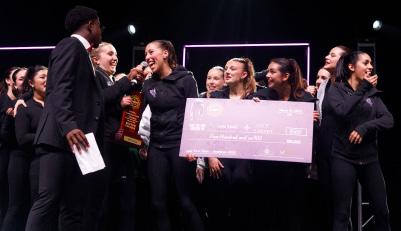
Fuego del Corazón
Dancers in white uniforms and blue fringe skirts lined up as Fuego del Corazón took the stage. The music was interrupted by a crew of cruise-goers announcing Fuego’s tour across the Caribbean. The Latin dance group took home first place in the 2019 Showdown competition category and went on to win this year’s runner-up award.
Traveling across islands in the Caribbean, Fuego waved the flags
into their performances.
The crowd welcomed each team to the stage with cheers, but there were mixed reactions to the firstplace result.
Some members of the audience
of Cuba, Haiti, the Dominican Republic, and Puerto Rico. The narrator gave brief descriptions of the destinations, with mentions such as Haiti’s Port-au-Prince garnering loud exclamations of pride from the audience.
The dancers quickly began their routines with each port of call. Audiences cheered on the dancers with each stop on the cruise, and distinct Latin dance styles made the group’s vacation theme come to life.
Featuring lively spins, fast foot-
Golden Eagles
A phone call buzzed in the background as the Golden Eagles took the stage, posing Charlie’s Angels–style, for their first-ever Showdown performance.
While the Golden Eagles have never performed at Showdown in their 30 years at BC, they are certainly not new to performing in front of screaming crowds.
The all-female team accompanies BC’s Marching Band, performing at football games for rowdy sports fans.
For its Showdown debut, the team opted for a Charlie’s Angels –themed performance, wearing all-black leotards accented by the red lights glowing on the stage. The phone call harkened back to the iconic movie from 2000 and signaled the start of the routine.
The Golden Eagles wove their background in marching and pom throughout the performance with synchronized moves you would see on the field. The team brought out red flags to wave around during its performance.
They included a pom-style dance
to close out their routine. In addition to their classic marching and pom moves, the Golden Eagles incorporated dance styles that are more traditionally seen on stage.
With Fergie’s “A Little Party Never Killed Nobody (All We Got),” the dancers dropped into shocking splits at the drop of the beat, making the crowd go wild.
The all-female routine, with striking dance moves and confident movements, exuded girl-power energy, as the dancers returned to their Charlie’s Angels poses to close out their debut performance.
Masti
A voice boomed through the speakers as the Bollywood fusion dance group Masti crafted a storyline throughout its sprawling routine. A narrator wove together a story about clashing clans that were united when two of their members fell in love.

Introducing each of the figures in their theatrical story, team members took turns taking center stage as the music shifted for each of the new characters. When the warring clans collided at the festival of Holi,
dancers lined the sides of the stage, facing off in a battle. While telling a romantic story of forbidden love, the dancers impressed the crowd with their sharp and synchronized movements and high jumps as they commanded the stage. The dancers also showed off their acting skills with their theatrical battle.
The tempo of the music slowed, and the lovestruck couple followed each other to the center of the stage for an intimate moment before other dancers streamed around the pair.
The narrator explained that the couple’s marriage created peace be -
cheered for BCDE, while others booed to express their disagreement with the awards. Benjamin and Ali thanked the crowd for the night of cultural celebration as students began to file toward the exits.
work, and central rhythms, Fuego energetically led the crowd on a tour of Latin culture and dance. Including a dance to Romeo Santos’ “Inocente,” much of the choreography called for male and female pairs dancing in sync.
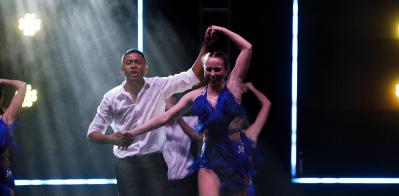
On its last stop in Puerto Rico, Fuego performed a stunt in which three members lifted up a female dancer, who did a split in midair. The Latin team then struck a final pose, closing out the night’s first performing group.
tween the two clans, and the dancers streamed together in a precise, moving circle that stretched the width of the stage.
Masti’s story of peace connected to the night’s celebration of community. As the dancers’ colorful traditional garments flowed behind them, the crowd reacted to the drama of the story.
The routine combined Bollywood music with deep bass beats of popular Western music. The emotive theatrics continued to the final moment, as the dancers dropped to the floor and the stage went dark.
BC Irish Dance
BC Irish Dance (BCID) introduced its set in a video describing the origins of Irish step dancing and the importance of Irish history, language, and culture. Katie Fox, CSOM ’22 and co-captain of the dance group, highlighted the unity at BC that BCID tried to portray through its performance.
Immediately following the video, an intense Game of Thrones theme began to play, and the dancers made their way to the front of the stage. The echoing words, “My name is Jon Snow,” entranced the crowd.
The Game of Thrones soundtrack played throughout BCID’s set, with splices of contemporary artists, such as Eminem and Billie Eilish, throughout. The team’s dark uni-
forms, dark lighting, and fierce acoustic music all contributed to an air of somberness in the routine.
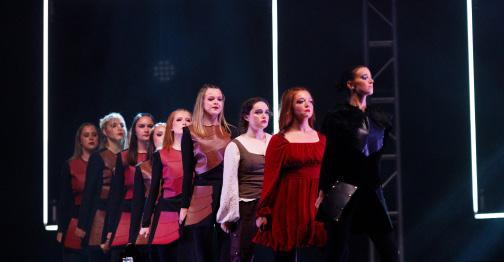
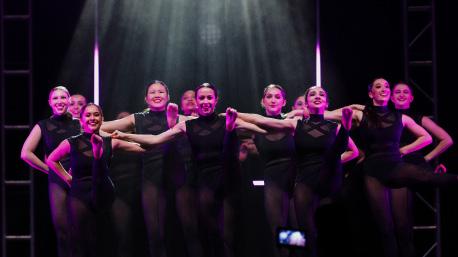
The step dancers maintained straight faces as they performed high kicks and spins, allowing their legs to portray their passion.
Dancers rapidly built up the tempo of the jig as the music—and their energy—crescendoed. Placing their hands on each other’s shoulders, the dancers moved in a mesmerizing circular movement.
At one point, the team cut the music during its performance, leaving just the captivating rhythm of the dancers’ shoes striking the stage.
The routine’s courtly tone was interrupted by the final, upbeat song “Heads Will Roll” by Yeah Yeah Yeahs, inciting the audience to sing along.
ARTS A9 Monday, March 21, 2022 The heighTs
The masters of ceremonies gave a warm welcome to the arena of students.
Fuego’s music and dance styles represented Latin American cultures.
The Golden Eagles locked arms in solidarity for their Showdown debut.
Masti, dressed in eye-catching garments, used intricate hand formations.
BCID dancers held stoic expressions during their performance featuring a Game of Thrones theme.
VIP
The modern Latin fusion dance team Vida de Intensa Pasión (VIP) also wove a compelling storyline for the rowdy audience to follow along to.

The lights went up, and the high tempo immediately sparked a new wave of energy, as the dancers flipped in the air on the shoulders of their partners.
The dancers dramatically ripped off the masks during the routine, arousing excitement from the audience.
Wearing red, tasseled costumes that flew out from their hips, female performers spun around their male partners as their feet moved in a flurry of rapid steps.
Other dancers wore sleek black pants and white collared shirts that emphasized the elegant masquerade theme.
Costume masks obstructed dancers’ faces, keeping the attention on their precise footwork and the dynamic between the partners.
The drama of a love triangle unfolded onstage, and the members emotively lip-synched to dialogue.
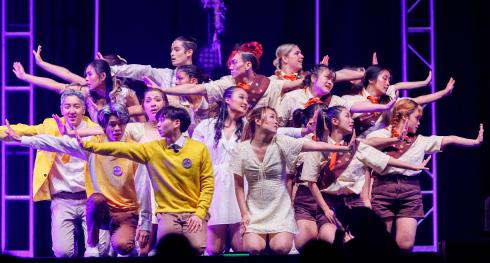
DOBC
The Dance Organization of Boston College (DOBC), with a mission to empower women across campus, took the stage with a routine inspired by Black Widow, the only female in the original Avengers superhero lineup.
As quotes from the Black Widow movie blasted through the speakers, the dancers gracefully leapt across the stage. Their routine then faded into an eerie, slowed-down
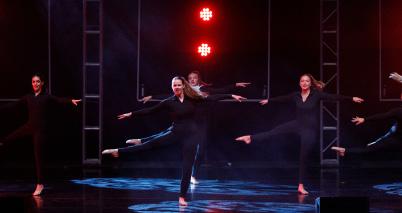
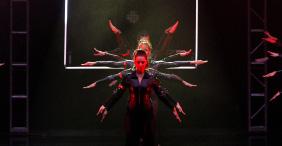
When the woman at the center of it all rejected one man and strutted into her partner’s arms, the crowd cheered as the pair embraced with a sultry kiss.
The team showcased its range of talents, as the dancers shifted from their graceful ballroom style to sharp, almost robot-like movements, their chests bumping to the beat.
In a dramatic final formation, the male dancers lifted their partners onto their shoulders, and the lights went down on their outstretched arms.
UPrising
UPrising Dance Crew’s vice president Paddy Murphy, CSOM ‘22, and creative director Shannon Liu, Lynch ’22, promoted a message of intergenerational unity in the team’s introductory video. This spirit of unity echoed throughout the performance.
A member brought a big bundle of colorful balloons on the stage, immediately bringing to mind Disney’s movie Up, which was the dance team’s playful theme set alongside its agenda of intergenerational appreciation.
cover of “Smells Like Teen Spirit” by Nirvana.
DOBC, sticking to its girl-power theme, also incorporated many songs about powerful women, including “Black Widow” by Iggy Azalea and “You Don’t Own Me” by Leslie Gore. The words “I do believe in the empowerment of women,” rang throughout Conte as “Bad Girls” by M.I.A. began to play.
The dancers completed a routine full of beautiful movements and a powerful storyline. The team incorporated partner danc-
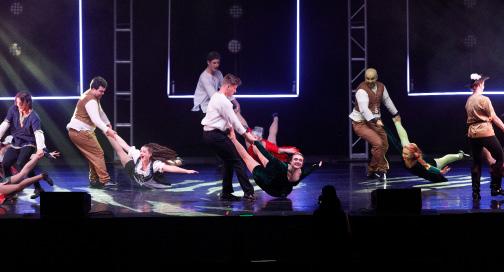
ing toward the end of the routine, emphasizing its mission of solidarity among women. The routine incorporated stunning pirouettes and jaw-dropping splits and formations.
DOBC even got the crowd involved when “Seven Nation Army” by The White Stripes started to play, inspiring everyone in the audience to clap along. Because of its interactive performance and stunning routine, DOBC was crowned runner up for the crowd’s choice award.
The routine revolved around explorers looking to get their final merit badge for helping the elderly, just as the young protagonist Russell had desired in Up. Wearing identical scout uniforms, UPrising’s set was endearing to the audience. But their dances often juxtaposed the charming outfits. UPrising’s moves were fiery and alluring as the dancers speedily switched formations.
The group’s hip-hop dance style was paired with well-known classics, such as a rendition of Ben E. King’s “Stand By Me,” adding an air of nos-
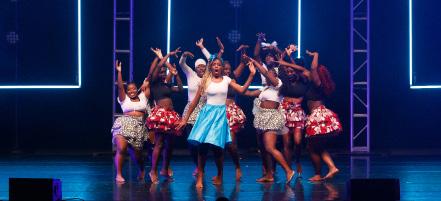
talgia.
Songs from artists such as the Black Eyed Peas and Macklemore were mixed with a remix of the Little Einsteins theme song, as well as the famous Up soundtrack.
Dring “Rocketeer” by Far East Movement, the dancers quickly arranged themselves in an airplane shape, with arms stretched out and moving in sync. UPrising and its set garnered many cheers from the audience, which enjoyed the familiar tunes, sleek hip-hop choreography, and wholesome message.
Full Swing
Sticking to the 1930s and 1940s for inspiration for its swing dance style, Full Swing opted for a more modern-inspired theme of Shrek The energy in the crowd soared as the members of Full Swing came out in full Shrek attire, including green body paint, with “Accidentally in Love” by Counting Crows blasting through the speakers.
The performance stuck to a medley of pop songs from the Shrek 2 soundtrack, such as “FunkyTown” by Lipps, Inc. and “Livin’ La Vida Loca”
by Ricky Martin.
The dancers were tossed by partners and flipped throughout the routine, all while sticking to the Shrek 2 storyline. Fiona even defeated Prince Charming through an impressive lift. As Shrek and Fiona briefly changed from ogres back to people on stage, “SexyBack” by Justin Timberlake played. Between the different scenes of Shrek being performed, the stage went dark as the dancers changed into costumes.
During one of the breaks, the galloping steps and voice of donkey sounded through the speakers, an-
nouncing that Fiona and Shrek arrived at their destination as the group reminded fans of the popular animated movie.
Toward the end of its routine, the group performed an especially impressive partner move in which one dancer grabbed a hand and a foot of their partner and swung them in a circle, gliding just inches above the stage floor.
Full Swing’s creative and high energy routine truly proved that “it don’t mean a thing if it ain’t got that swing,” harkening back to the group’s motto.
BCDE
The ring of a telephone reverberated through the rafters of Conte Forum as BCDE took the stage for its performance centered around female empowerment.
Red lights gave the stage an ominous glow that outlined the dancers’ sleek black cat suits.
For their Charlie’s Angels–themed routine, the dancers struck combative poses with their arms clasped and pointing out to the audience. BCDE’s set featured music ranging from hard rock
to pop songs, including “Barracuda” by Heart.
With a sudden shift in tempo, the dancers slowed their movements as a sinister-sounding remix of “Toxic” by Britney Spears played and the crowd screamed as they recognized the iconic tune. The arena fell completely silent for one second when the music dropped out before the dancers reignited the stage with acrobatic flips that garnered applause from the audience.
Most of the 26 dancers let their teammates have the spotlight for one number, as a small group of dancers
gave a solo performance, effortlessly moving in sync and landing in splits on the floor.
Others crouched on the flanks of the stage before surging into exact formations behind the solo dancers. Dancers showcased their classical training as they filled the stage and performed tight turns, their heads whipping around to meet the captivated eyes of their audience.
The Showdown champions finished off their winning set with a slow, seemingly triumphant strut to the back of the stage.
PATU
Many friends of Presenting Africa to You (PATU) dancers left their seats and got up close to the main stage in order to film and cheer on the dance group that blends traditional and modern African dance styles. Dressed in colorful patterned skirts, PATU reflected African cultures and heritage through its routine.
Its cultural celebration also came through in the music and unique dance styles of the performance. The set featured energetic rhythmic movement and an emphasized bass vibration, stirring up the audience’s enthusiasm.
PATU’s performance was structured around the story of Alice In Wonderland, and its soundtrack incorporated
quotes from the 2010 Alice in Wonderland movie. Their costumes emulated those of the characters in the film, with a dancer dressed in blue as Alice and one as the Mad Hatter in a patterned set.
The dancers evoked cheers from the crowd with expressive choreography and matched the beat with fast and synchronized movements.
Many body rolls and quick-paced maneuvers formed PATU’s set, exciting loud cheers from the crowd.
The marimba in DJ Flex’s “Put Your Back In It” created a lively atmosphere, complementing the fast footwork of the dancers.
In the final climactic moment, dancers acted out Alice’s murder of the Jabberwocky monster as thumping bass beats reverberated through the arena.
ARTS A10 Monday, March 21, 2022 The heighTs
DOBC formations resembled spiders, complementing its Black Widow theme.
Dancers performed Latin-style duets that featured spins and fast footwork.
UPrising dancers dressed up for their theme based on the popular film, Up
Full Swing members gripped each other as they spun, almost grazing the floor.
The Showdown winners highlighted their range of technical dance training.
Dancers of PATU acted out the magical storyline of Alice in Wonderland, displaying their acting skills to pull the audience in.
On Tap
Singing in the Rain is the most quintessential tap movie, so it only makes sense that BC On Tap paid homage to it in its Showdown routine.
Beginning with “Singing in the Rain” by Gene Kelly, the team recreated the most well-known scenes from the movie.
Throughout the routine, the dancers lip synced lines from the movie. Most of the dancers were wearing black leotards with sparkly
skirts, occasionally worn with white button downs on top. Other dancers had on sparkly pants with the same white shirt.
On Tap accomplished its goal of blending tap with 21st century elements by tapping to a remix of “Singing in the Rain” in addition to the traditional version at the beginning of the routine.
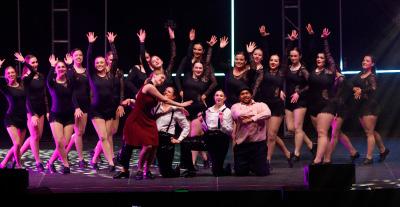
During the remixed version, the dancers donned yellow rain jackets and white umbrellas, similar to what characters wear in the movie. The intricate tapping sounds were
audible for the audience as the music lowered and just the beat played in the background. The dancers’ feet pounded the stage as their arms swung loosely with the rhythm.
A modern twist on tap reappeared when the group danced to a medley of pop songs, including “Umbrella” by Rihanna and “Rain on Me” by Lady Gaga and Ariana Grande.
To close its routine, On Tap returned to “Singing in the Rain,” forming a line and bowing as the lights faded out.
Sexual Chocolate
The venue echoed with the loudest cheers of the night as the popular all-male step team assembled on stage for its ’90s themed set.
Recognizing the ’90s as the era of hip-hop’s rise, an audio clip played of a commentator criticizing the genre as having a negative impact on society.
The dancers burst into their choreography as the lights went up, and a different voice asked “What are they talking about?” Dressed in
vibrant beanies, overalls, and their signature Timberland boots, the dancers leaped and flipped over each others’ backs for an electrifying start to the routine.
The music cut out for the group’s first step sequence. Their hands flew across their shoulders and knees as they created their own rhythms.
Dancers jumped in the air, and, landing perfectly in sync with each other, their work boots made a resounding boom.
The music resumed with a medley of ’90s hits, including “In da
Club” by 50 Cent, as a dance battle ensued.
The crowd watched in awe as the dancers moved their limbs powerfully before the dueling teams united with one mighty stomp, using the stage as their instrument.
Coming to the end of their set, the dancers commanded the stage and moved their arms to encourage cheers from the crowd.
When the lights went down on the dancers’ final dramatic stance, the crowd was left buzzing about Sexual Chocolate’s performance as the next act began.
Synergy
Synergy Hip Hop Dance Company came out in full force, organized in colorful camouflage outfits. The group wasted no time in triggering loud exclamations from the audience. The dance group melded the hip-hop style with its military theme.
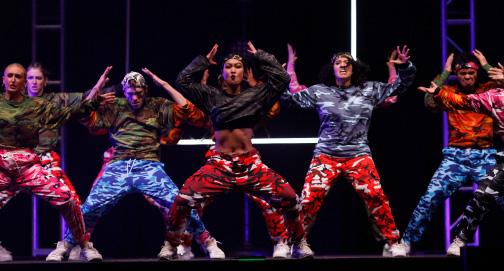
Loud alarms aroused the crowd, alerting the incoming blast of fastpaced choreography and quick dance transitions.
The flashing strobe lights built
up the energy of Synergy’s dynamic performance and shined on its seemingly effortlessly synchronized choreography. The team created a spectacle for its crowd as the dancers spread across the entirety of the stage.
The drill sergeant narrator’s commands to “Stick together. Never leave a man behind,” were proven by the dancers in their synchronous movements. The set stuck to its military theme in marching dance moves, salutes, and helicopter sound effects.
The dancers scoped out the arena, danced in crouched formations, and did body rolls to the music of artists like Migos and Wiz Khalifa.
Elements such as the bugle wake-up call and a voice commanding “Soldiers, report to duty,” added to the entertaining atmosphere Synergy cultivated in its performance. The dancers showed off their passionate, popping moves.
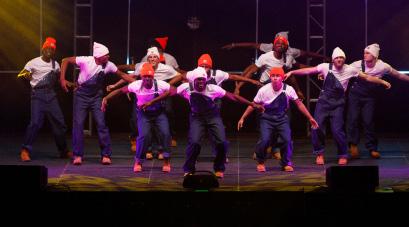
The dance team’s hip-hop and combat-style routine was proven effective in garnering the attention and rowdy cheers of students.
Phaymus
“Welcome to the 2022 Gramm ys” boomed through the speakers as Phaymus Dance Entertainment took the stage for its awards-inspired performance.
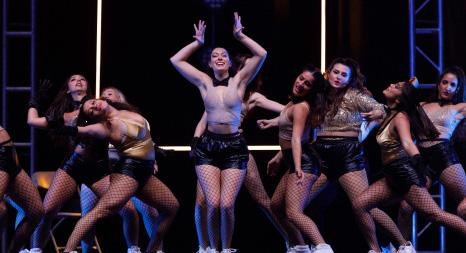
Its theme for this year’s Showdown channeled female empowerment. The dancers accomplished this theme by dancing to songs made by various female Grammy winners.
Before Phaymus captivated the audience with its sultry dance
moves to each song, a voice announced the category the song was nominated in. One category was for trendsetter, in which “hot girl herself” Megan Thee Stallion won for her song “Cry Baby.”
Later in the performance, the announcer asked “Any Barbs in the house?” which was met with shouts from the crowd.
The Barbs, the nickname for Nicki Minaj’s fans, in the house were then satisfied as the crew started to dance to “Roman’s Revenge” by Minaj.
The routine blended classic hip-
hop moves like popping with more sensual elements as the performers danced on chairs and flipped their hair.
The female dancers’ costumes matched the awards theme as well, with their gold, bedazzled tops like the Grammys.
As the last note of “Body” by Megan Thee Stallion, winner of Best New Artist at the 2021 Grammys, played to close the performance, one dancer stood with a gold trophy in her hand and raised it in a victorious pose after a crowd-pleasing performance.
F.I.S.T.S.
The all-female step team Females Incorporating Sisterhood Through Step (F.I.S.T.S.) celebrated community and female empowerment with its cheerleading theme. The team’s leaders said in their introductory video that they were celebrating the work of Black female artists, and all of the dancers were decked out in black-and-white outfits with pink hair bows.
A referee ran across the front of the stage blowing a whistle to signal
the start of F.I.S.T.S.’s set. The team created its own rhythms onstage with stomps and claps. Minimal segments of music during its routine ensured that the members’ self-generated beats were on full display. A loud bang rang out from the stage as the dancers suddenly dropped to the stage floor.
Getting the audience revved up, dancers motioned for students to clap and chant along with them.
In one moment that earned cheers from the audience, the dancers assembled in a triangular formation as
the performers in the front started a marching beat, and, creating a domino effect, the dancers behind them gradually joined in on the rhythm.
The team divided into groups and performed some cheerleading stunts, lifting dancers into the air as they pointed their arms to the ceiling. Vocal elements appeared throughout their set as the dancers yelled out “Yes, ladies.” To close out F.I.S.T.S’s performance, the music cut out, and the dancers left the audience with a step sequence, letting a final stomp echo through the arena.
AeroK
AEROdynamiK Dance Crew (AeroK) sought to welcome all backgrounds to an appreciation for Korean culture and expressed interest in combatting xenophobia in the group’s introductory video. Visual coordinator Dorothy Zeng, CSOM ’22, and choreographer Austin Lu, MCAS ’22, concluded their video with a question that inflamed the crowd with enthusiasm.
“Before we begin, we have a question for you—red or blue?” they said in the video.
The question, a nod to the popular Korean series Squid Game, initiated the dance crew’s theme for Showdown 2022. Dressed in the show’s precise guard and player uniforms, AeroK made its mark as

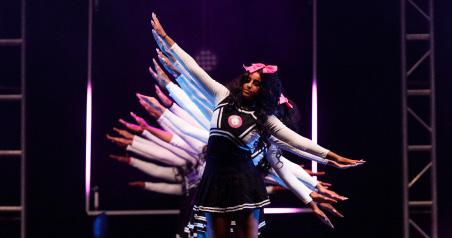
the competition’s last performer.
The team mesmerized the audience with both rapid footwork and hip-hop combos to the music of Post Malone’s “Motley Crew.” These explosive moves were interrupted by parts of its set that called for slow motion, adding to an air of anticipation. AeroK split its members into the two Squid Game groups—players and guards—and revolved its routine around joint choreographies.
The dance crew often orbited a central dancer, which alternated throughout its performance. AeroK often infused the narration of quotes from Squid Game with beat drops. A member garnered shouts from the crowd after doing backflips. AeroK left the crowd wanting more as the competition’s programming concluded, followed by the suspense of award presentations.
ARTS A11 Monday, March 21, 2022 The heighTs
On Tap blended traditional tap with modern elements, dancing to pop songs.
Sexual Chocolate was the crowd’s favorite as its created their own stomping rhythm.
Synergy’s routine stood out in the competition despite its camouflage outfits.
Phaymus cleverly modeled its set after the Grammys award show.
F.I.S.T.S. highlighted its skills with minimal music and tight formations.
AeroK transported the audience into the popular television series, Squid Game , for its hip-hop routine.
PHOTOS BY VIKRUM SINGH / HEIGHTS EDITOR AND LEO WANG / HEIGHTS STAFF
Stuck Between a Rock and a Warm Place
my bank statement, before getting serious about planning for Spring Break.
On a cold December afternoon, one of my roommates walked into my room, gesturing at her phone and a GroupMe titled “BAHAMAS 2022” that included roughly 200 members of our class, and said, “So, are you going or not?” At that moment, sitting at my desk in my Walsh eight-man, I realized I needed to make a decision: What the hell was I going to do for Spring Break?

When a college student makes plans for Spring Break, they consider many factors. Among cost, destination, travel arrangements, vacation packages, the options are endless and overwhelming. But, they all boiled down to two categories for me: go home for the week or travel with your friends.
From the start of the Spring Break decision-making process, I struggled to even consider the options. At the time, staring down what was shoring up to be a rocky finals season, I couldn’t even mentally grasp at Spring Break plans. March seemed too far away, and Spring Break felt insignificant in comparison to the slew of papers, exams, and final projects that I had only begun to tackle. So, like any good procrastinator, I waited until the last possible second to get on the phone with my parents, poll my roommates, and of course, check
After one less-than-desirable glance at my Bank of America balance, I came to the bitter realization that my options for Spring Break were, to put it nicely, coming up against some serious financial restrictions. Although I could, in theory, pay for the Spring Break trip, I didn’t feel as though I could afford it. I found myself asking questions like “If I go on this trip, will I be stressed about money for the rest of the semester?” and “Should I be saving this money for travel while I’m abroad?” Although I quickly realized that I would never feel good about spending a significant portion of my savings on a Spring Break trip, I still wasn’t convinced that I should forgo the trip all together.
With that sentiment, I decided to take a serious look at the mental and emotional pros and cons of the infamous college spring break experience. As someone who prides herself on living every day in hopes of truly getting the most out of the “Boston College experience,” I’ve come to realize that there isn’t exactly time for R&R during the semester. Between classes, extracurriculars, sports games, and friends, being overtired and overcommitted has become the norm. With that, the urge to go home, sit on my couch, get a full eight hours of sleep, and do absolutely nothing began to look almost as appealing as the beach and a beverage. But, in the back of my mind, intrusive thoughts still lurked: “If I choose not to go, what will I be missing out on?” and “Is my anticipated FOMO powerful enough to outweigh my very real financial and emotional stressors?” Feeling confident that my
future self would thank me for prioritizing my personal greater good over a few days in the Bahamas, I finally decided that it was in my best interest to save some money, get some sleep, and head home for Spring Break.

As March 5 approached, however, I began to realize that I had severely overestimated my ability to avoid FOMO. As my roommates began to shop, make nail appointments, and discuss party packages, I went from looking forward to my time at home to wishing I was going to the Bahamas. But, even in this very dark, FOMO-intense moment, I still felt like a few days at home would do wonders for my under-eye bags and my academic motivation.
Fast forward 10 days and Spring Break has already come and gone. So, now that I have had the opportunity to reflect on my Spring Break experience, I have come to a few important conclusions. To start, there are no bad Spring Break plans. My friends that went to the Bahamas claim that they could feel their bodies deteriorating on the beach while I have never felt better. And, what I’m lacking in a sick tan, I’ve compensated for in naps. So, is there really a perfect Spring Break plan? I would argue no. Plus, if you make a decision that feels good to you, who really cares? Although the financial stress coupled with my urge to sleep forever deterred me from Spring Break antics this year, come Spring Break 2024, you will find me, financially prepared and ready to party, on a beach somewhere.
Laying Out on the Quad
With the first glimpse of spring sun, campus seemed to come alive. Students broke out their dusty spikeball kits, footballs, and picnic blankets and spread out across any and all green spaces on campus to make the most of the sun while it lasted. Campus seemed to be healing, so to speak, as students (much paler than they were when they arrived on campus in August) emerged from their dorm-caves to greet the sun. Schoolwork didn’t seem as hard when done on the rapidly greening grass, iced drink in hand, and sunglasses resting securely on the nose.
A Prescription for Sound
muscles?
combo.
I am sure we are all too familiar with the major glitches that affected Spotify a week or two ago. Everyone was kicked out of their accounts, and there were plenty of comical tweets begging for Spotify to let us back in to keep listening to our coveted music. But in that brief period, if we hadn’t already caved and downloaded the disreputable alternative— Apple Music— perhaps we spent more time listening to our surroundings.




Perhaps we spent time, more specifically, listening to our outdoor surroundings. With temperatures rising and spring approaching, surely there were some pleasant sounds of birds chirping or water flowing through a stream. Although there are certainly (and unfortunately) more snow storms and cold weather in the future for us at Boston College, the sounds of spring will eventually prevail.
And that is quite fantastic news for us. The sounds of nature that will soon emerge from their winter hiatus are immensely beneficial to our physical and mental health. Natural noises simultaneously lower stress levels and improve overall health.
I know it seems like such a cliche that the sunshine and spring sounds will cure anything currently ailing you, but recent studies have actually measured that the biological and psychological effect that sounds of nature have on humans is overwhelmingly positive.
In my experience, there is a precipitous difference in overall mood on campus when a warm sunny day sneaks into the typically dreary months of February or March. I know I personally feel a lot happier on these days where I can wear my light jacket and put together a real outfit, as opposed to donning a parka over my sweatshirt-sweatpants
On these days of warmer weather, I, like many others, flock to the outdoor spaces on campus and soak up as much of the sunshine as I can. I sometimes feel, maybe in a psychosomatic way, a sort of meta-consciousness, a feeling of connection to the outdoors. But this is commonplace among people who spend significant amounts of time outdoors. Sounds of nature contribute to this feeling, as they are a tangible connection between humans and nature.
What’s great is now there is research explaining why I, and others, feel a lot better when I hear these “spring noises,” and I don’t have to convince myself that it’s just all in my head (a quite common occurrence).
Natural sounds affect the body and brain in a contrary manner compared to anthropogenic, or human-created, noise. Sounds in nature are linked to improvements in mood, cognitive performance, as well as decreases in pain and heart rate.
This is because natural sounds kickstart the rest-digest pathway, while anthropogenic noise triggers the fight-or-flight response. The rest-digest pathway is responsible for allowing the body to metabolize fuels and relax for sleep. Conversely, the fight-or-flight response is how our body deals with stressors and amps up attentional focus and heart rate in order to best deal with the survival situation at hand.
When looking at brain scans of people exposed to natural and subsequent artificial noise, there was a difference in brain connectivity. In a natural sound–dominated environment, the brain’s connections focus attention outwardly on the environment and surrounding world. With artificial noise, attention was focused inwardly, akin to the connections observed in anxiety, PTSD, and depression.
Think of two environments: a busy city block and an acre of untouched forest. In which area must you be more focused and on-guard? Which area calls for you to be on your toes, and which allows for you to breathe deeply and untense your
These answers should be lucid, and there is an acoustic reason that we are more relaxed in a forest as compared to a city block. Urban spaces call for our attention—car horns, phone calls, and the bustling noise of commuting all require us to analyze everything that is going on around us. On the contrary, the forest and other natural, outdoor areas do not call for constant attention and therefore give us space to recharge and relax. This makes sense in an evolutionary lens as well, considering that we need to be more alert in areas with noise indicative of danger.
The reason that we respond so positively to nature sounds is because they are consistent and occur at an agreeable pitch and noise level. Our brain classifies these natural sounds as non-threatening and induces the rest-digest pathway instead of the fight-or-flight pathway. This is why alarms, which are abrupt and vary in noise level, are not only effective at waking us up, but also incredibly disturbing.
Now don’t get me wrong, I would not be able to get by without listening to music. Walking to class without music is frankly unbearable, especially in the cold months. I can attest to this because I have lost my AirPods multiple times and have suffered silent walks around campus, study sessions, and workouts.
So, I am not saying that completely swearing off artificial noise is the way to go. Rather, this knowledge of the relaxing properties of the sound of nature is a great tool to have in our ever-so-stressful academic atmosphere. Maybe next time you’re stressed out, consider walking to the Res and sitting on a bench to listen to the wind in the leaves or the birds in the trees. Or even listen to one of the many podcasts or videos of “nature sounds.” Whether you actually notice a difference or not, these sounds will relax your body, maybe even to the point of sleep. And who doesn’t love a good nap?
Alli Hargrove is an op-ed columnist for The Heights. She can be reached at allison.hargrove@bc.edu.
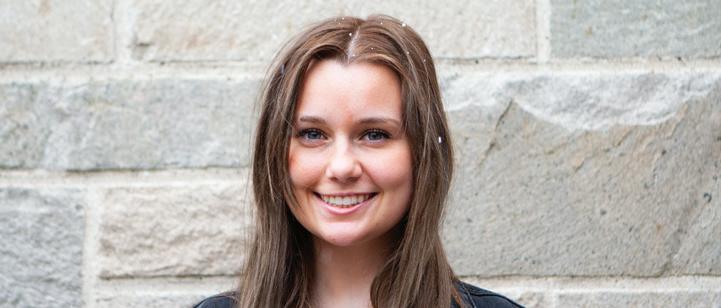
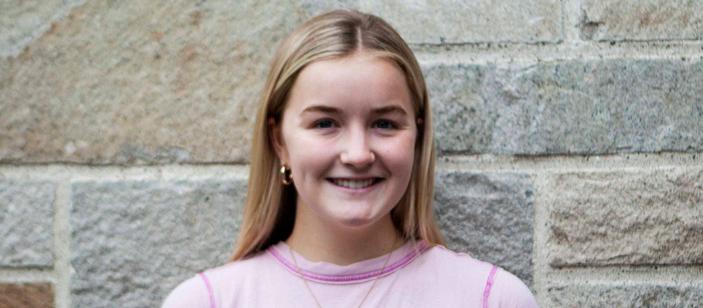
One Less Hour
No longer do students have to make the trudge home from class at the end of the day in the dark. Now, with the hour lost from daylight saving time, the sun is still securely in the sky at the end of the school day, making for a slightly less dark and depressing trek back to the dorm that doesn’t make you want to curl up in a ball and neglect your homework by scrolling on Herrd. The days are only getting longer, and summer is most certainly on its way.
Housing Stress
Pulling together the perfect group for your housing next year is already stressful without adding more uncertainties into the mix. The tension in dining halls is palpable as new groups meet and cling to each other for safety during this year’s housing Hunger Games. Everyone wants to hope they will be the one percent who gets their top choice housing pick (that eight-man in Walsh, that four-man in 2K, and, of course, the coveted Mods), but it’s inevitable that some will be disappointed by the outcome of their selection process.
Turn Down the Heater
As the weather (hopefully) gets warmer and warmer, the one thing that won’t change is the temperatures in all of BC’s buildings. If you were sweating a little while you basked in the sun this week, nothing could have compared to how you were sweating inside with the heaters almost matching the temperature outside. Despite no longer needing those floor-length down jackets, the inside of all buildings will still be heated as if we’re in the dead of winter (probably until we leave for summer break).
O
A12 Monday, March 21, 2022 The heighTs
PINIONS
Cameron Walker
alli Hargrove
The opinions and commentaries of the op-ed columnists appearing on this page represent the views of the authors of those particular pieces, and not necessarily the views of The Heights
Cameron Walker is an op-ed columnist for The Heights. She can be reached at cameron.walker@bc.edu.
GRAPHIC BY LIZ SCHWAB \ HEIGHTS EDITOR
Boston College Should Prioritize Student Mental Health with Proper School Breaks
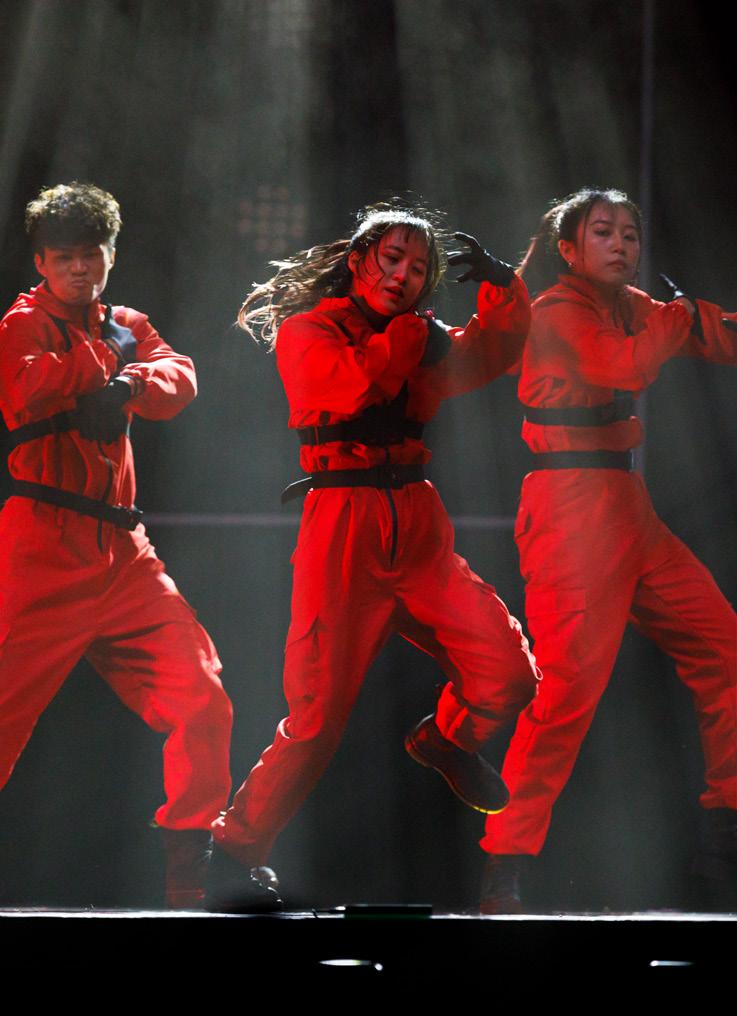
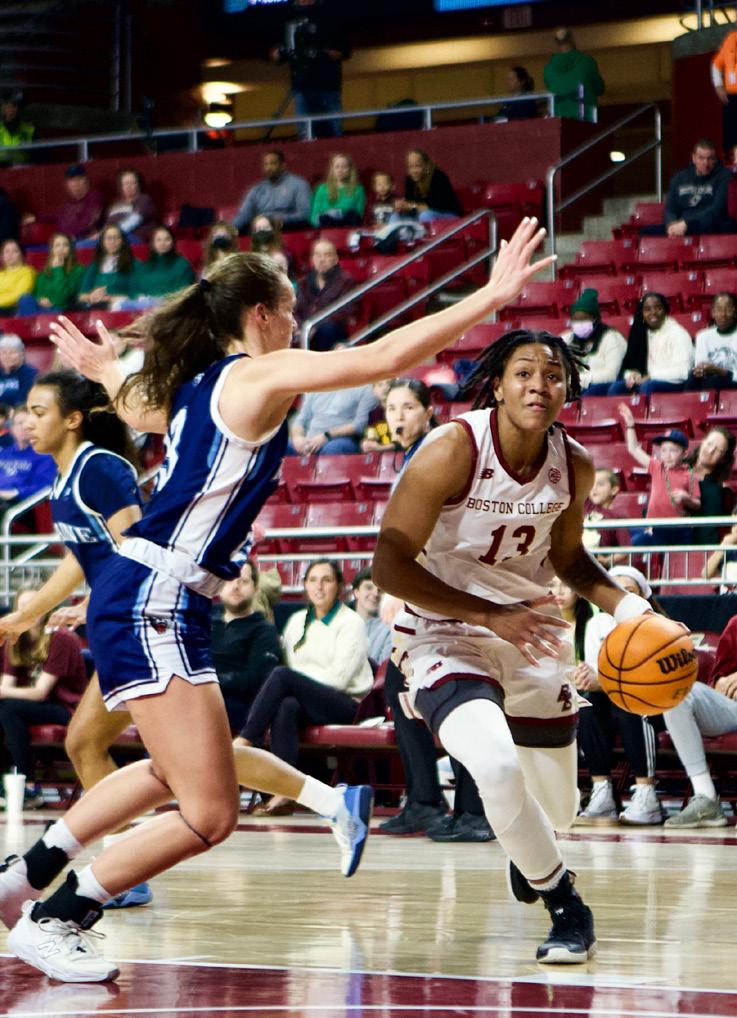
Boston College—as an institution grounded in the Jesuit, Catholic tradition— should better protect its students’ well-being by enforcing a policy limiting assignments due directly after breaks. This change would help the University prioritize students’ mental health and honor the Jesuit, Catholic commitment to cura personalis , or the care of the whole person.
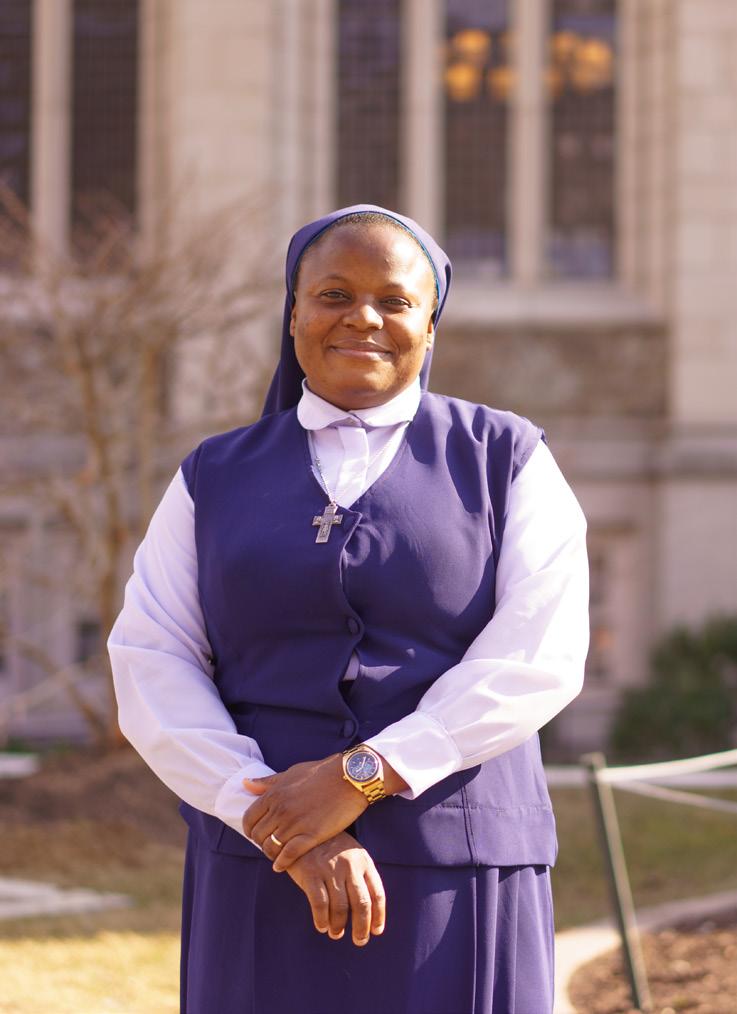
Students at BC are more than just students. They are also athletes, club presidents, student leaders, and most importantly—people. BC boasts that it educates well-rounded and reflective individuals, yet does not enforce students’ right to rest and reflect over break.
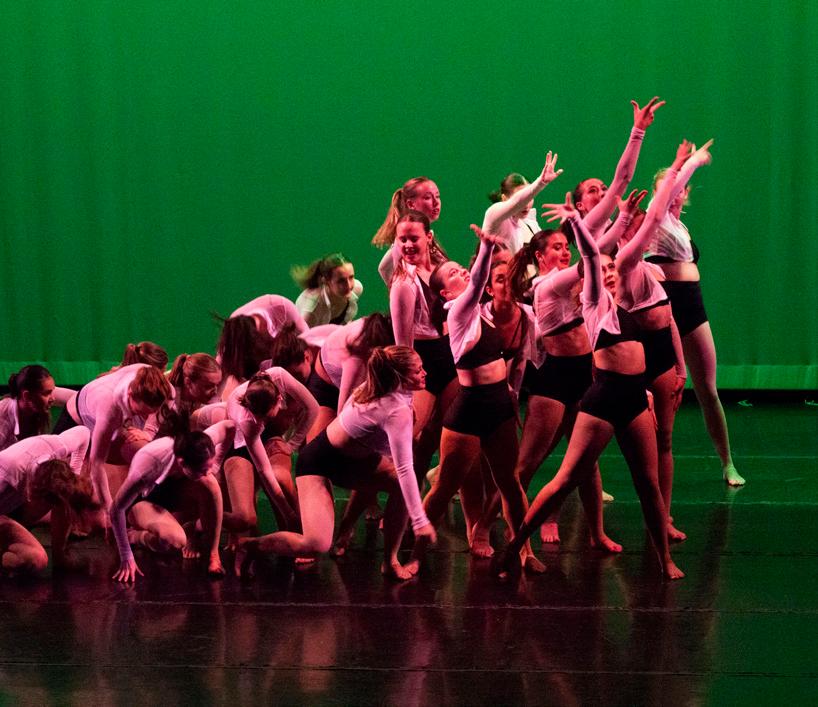
The University should implement a policy to ensure that breaks are not immediately followed by exams or large assignments. This policy could require departments and professors to not assign major papers, exams, or projects that are worth more than 10 percent of the class grade in the first three days after a major break.

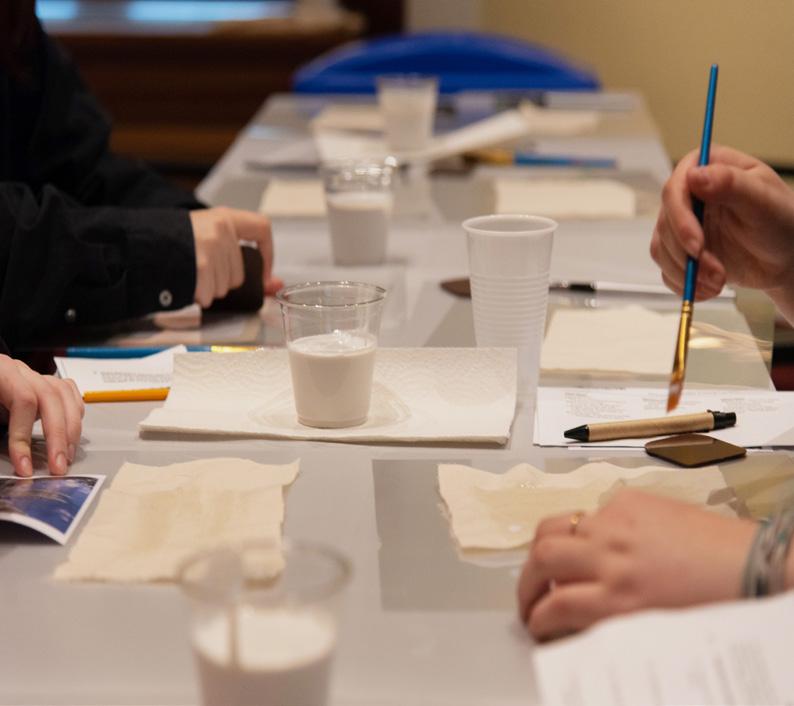
Students need rest throughout the semester for the sake of their mental health. In a survey conducted by Student Affairs, 44 percent of BC students rated their stress levels

as average or less than average. This means that 56 percent—over half—of BC students experience above average levels of stress.
One 2004 study from Tel Aviv University found that students who reported working during their Passover break were more likely to experience post-vacation burnout, while those who reported visiting friends and traveling for sightseeing were less likely to do so.
The length of the fall and spring semesters coupled with the scarcity of breaks contribute to feelings of burnout. The spring semester in particular is four months long with only three breaks: Martin Luther King, Jr. Day, Spring Break and Easter break. And, since Martin Luther King, Jr. Day fell directly at the end of Winter Break this year, it was merely an extension of Winter Break, not a break in itself. Students count on this limited built-in downtime to make it through the semester.
Yet this designated time for mental wellness and physical rest is too often undermined by large assignments and exams due immediately upon returning to campus. Final exams are more structured, with builtin study days and a set exam schedule, but midterms can last from February through
mid-March. Students are often hit with exams in the weeks leading up to Spring Break, and then are expected to return to more exams and assignments in the immediate days following break. This means that instead of taking time to reset and recharge, students must continue working and focusing on academics.

Beyond the choices of individual professors, sometimes entire academic departments schedule exams immediately after returning from breaks. For example, on the Monday following Spring Break this year, BC’s Spanish department assigned an inclass writing exam for students in Intermediate Spanish II—a class required for many Morrissey College of Arts and Sciences students to graduate. Whether or not a student gets to enjoy their break should not be left up to the whim of a professor or academic departments.
To fully honor its commitment to cura personalis , the University must ensure that students are afforded the right to rest during semester breaks. This would not only improve their mental and physical health, but ultimately aid in their academic success as well.
EDITORIAL A13 Monday, March 21, 2022 The heighTs
(Nicole Vagra / HeigHts editor); (BeN scHultz / For tHe HeigHts); (aditya rao / HeigHts staFF); (leo WaNg / HeigHts staFF); (Nicole Wei / For tHe HeigHts ); (Vikrum siNgH / HeigHts editor).
Top photos, left to right: The McMullen Museum held a St. Patrick’s themed “Art after Dark” event, where students listened to live music, joined a scavenger hunt, and tried different photography techniques this Friday, March 18, 2022; Boston College Dance Ensemble held a dazzling showcase on Friday, March 18, 2022.
Bottom photos, left to right: Forward Taylor Soule advanced with the ball during the women’s basketball game against Maine this Thursday, March 17, 2022; AEROdynamiK performed a routine inspired by the show Squid Game during ALC Showdown this Saturday, March 19, 2022; Sr. Chimbuoyim Uzodimma was named the 2022 New Testament Emerging Scholars Fellow, Friday, March 18, 2022; Boston College Theatre Department put on Truth/Dare, directed by Devyn Itula, MCAS ’22, on Thursday, March 17, 2022.
Baseball Suffers 16–8 Loss to Close Out Series


 By Graham Dietz Asst. Sports Editor
By Graham Dietz Asst. Sports Editor
“Good pitching beats good hitting,” is one of those ambiguous, half-assumed conventions of baseball wisdom that is usually true. But on all fronts of Boston College baseball’s Sunday matchup against Virginia, good hitting outmatched good pitching in the rubber-match affair that fell dominantly in Virginia’s favor.

The No. 19 Cavaliers (19–1, 4–1
Atlantic Coast) pulled the rug out from under the Eagles’ fifth-inning momentum with three runs in the sixth and ultimately downed BC 16–8.
Every time the Eagles (7–11, 1–5) found a hitting rhythm and chipped back, Virginia wouldn’t relent, and the deficit grew larger and larger.
But BC showed fight all game. Down six runs with two innings to play, Cameron Leary delivered a shot to right field, hitting a home run that sent Travis Honeyman and Sam McNulty home, and the Eagles were down by three again.
Virginia showed no signs of quitting
in the bottom of the inning, though. Jake Gelof, the nation’s home run leader, stepped to the plate for the fourth time and singled to right center.
Earlier in the game, Gelof hit a homer, marking his 12th home run of the year and third of the series.
With Alex Tappen up to bat, Gelof stole second. Tappen typed the final punctuation mark, getting a full swing on an inner-plate fastball to send one to the upper bleachers, adding two insurance runs. Tappen and Gelof were a perfect 8-for-8 on the day.
BC started senior Mason Pelio on
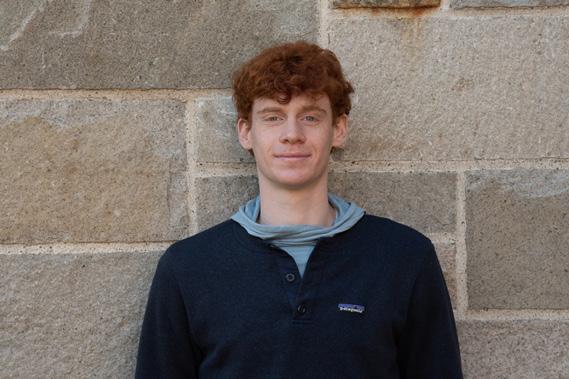
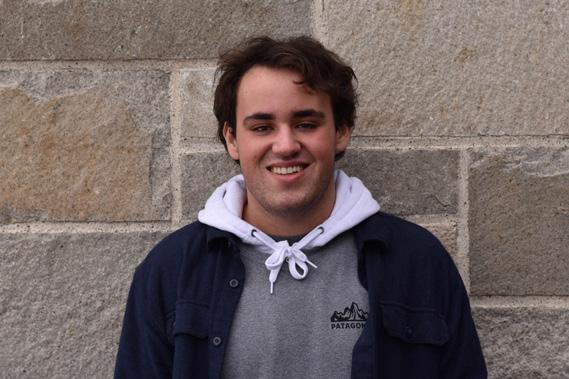
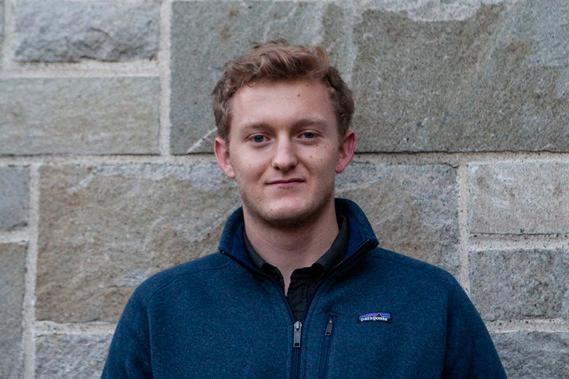

the mound, who has yet to return to his 2019 form due to injury. Since his injury, Pelio has seen limited time on the mound, looking to restore his arm to its former shape.
After the second inning, Pelio’s command of the strike zone went unsteady, and from a controlled start to a shaky finish, the senior was responsible for three runs in the game.
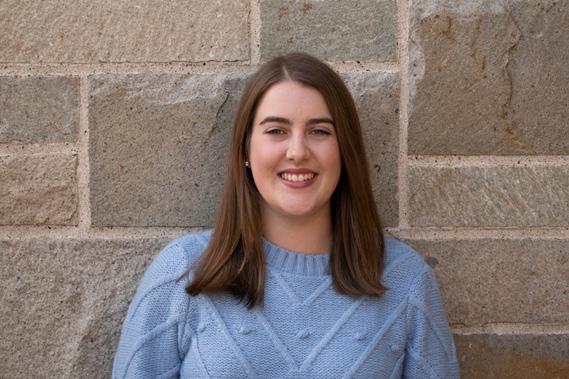
Pelio was replaced on the mound in the bottom half of the third inning by Charlie Coon, an off-speed southpaw. Coon was disciplined on the mound, dealing out changeups and curve balls
FALL FROM GRACE
synchronously, but he couldn’t stop the red-hot Cavaliers.
In the fourth inning, BC’s Luke Gold blasted a shot to deep center field, putting the Eagles on the board. In the fifth inning, Gold raked his first triple of the year to the right center gap to cut BC’s deficit to 8–4.
But Virginia had BC back on the ropes again shortly, and the Eagles couldn’t hold off Gelof’s fire, which
Read the rest of this story at www.bcheights.com
Pitchers at the Plate
With a crowd of nearly 6,000 packed in Alumni Stadium, No. 1 BC lacrosse faced its toughest opponent of the season in No. 2 North Carolina on Sunday. Down by as many as six goals, the Eagles had a late comeback in the fourth quarter but came up short by one goal, earning their first loss of the season.
Lacrosse, from A1
The Tar Heels pulled away in the second quarter, as they went on a four-goal unanswered streak. North Carolina’s defense stole the show, limiting BC to only five shots in the second quarter, three of which were off target. The Eagles entered the locker room at halftime down 7–4.
BC head coach Acacia Walker-Weinstein attributed the second-quarter slump to her team lacking urgency.
“It was almost as if we just needed a wake-up call to play really hard,”
Walker-Weinstein said after the game. “We can’t be inspired by that, you know, we have to be inspired by doing what we want to do.”
With the support of a crowd of nearly 6,000 people, the Eagles regained their footing in the third quarter, overcoming a challenging North Carolina defense, and closing the gap between the two teams to just two goals. But the damage had already been done, and North Carolina ended the quarter up 13–9.
BC had the entire stadium holding its breath throughout the fourth quarter, and both its defense and
offense woke up. The Eagles’ defense limited North Carolina to only three goals, while its offense scored six, finally giving the Tar Heels a run for their money.
“You can’t wait 45 minutes into the game to play like you are expected to play,” Walker-Weinstein said. “Unfortunately, we did that today, and we had to climb out of a rut—and against a good team.”
With five minutes left to play, the Eagles found themselves down by two goals and within reach of victory. Despite the efforts from BC’s offense, the rut was too deep, and BC failed to
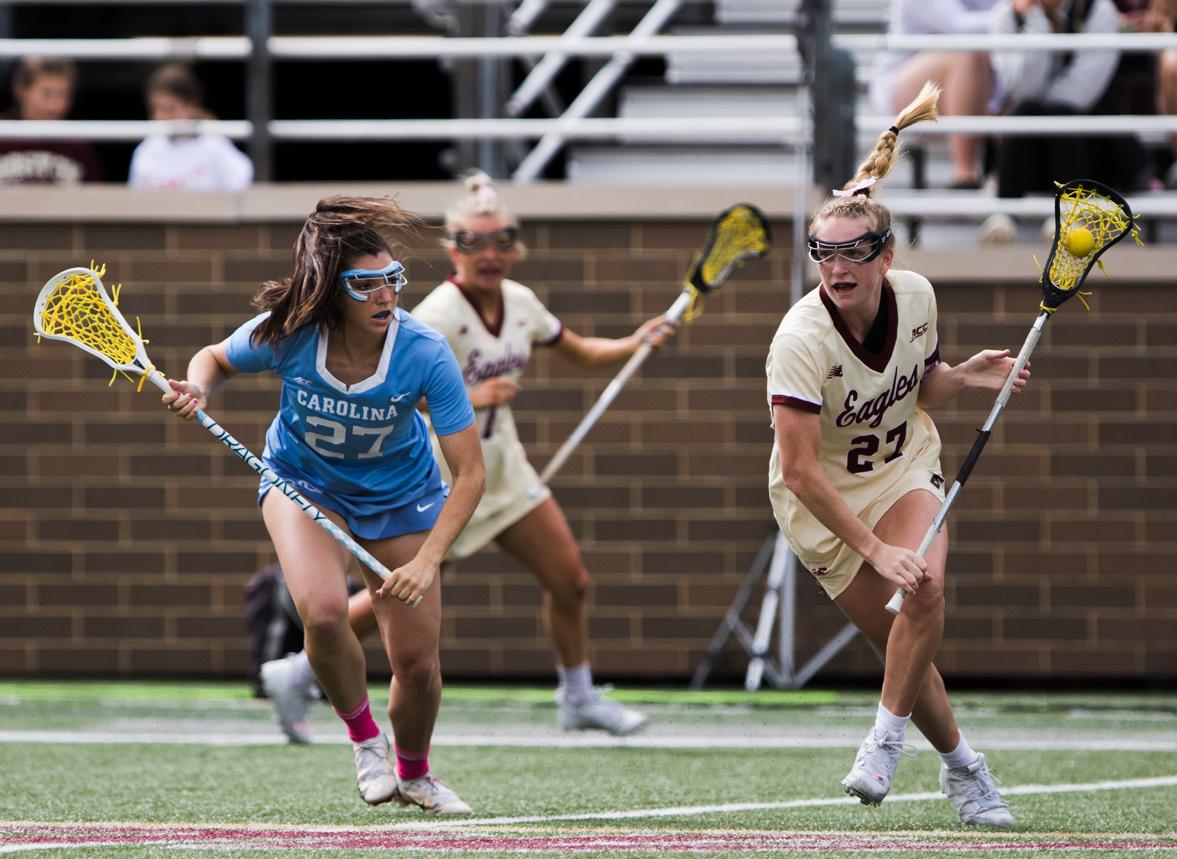
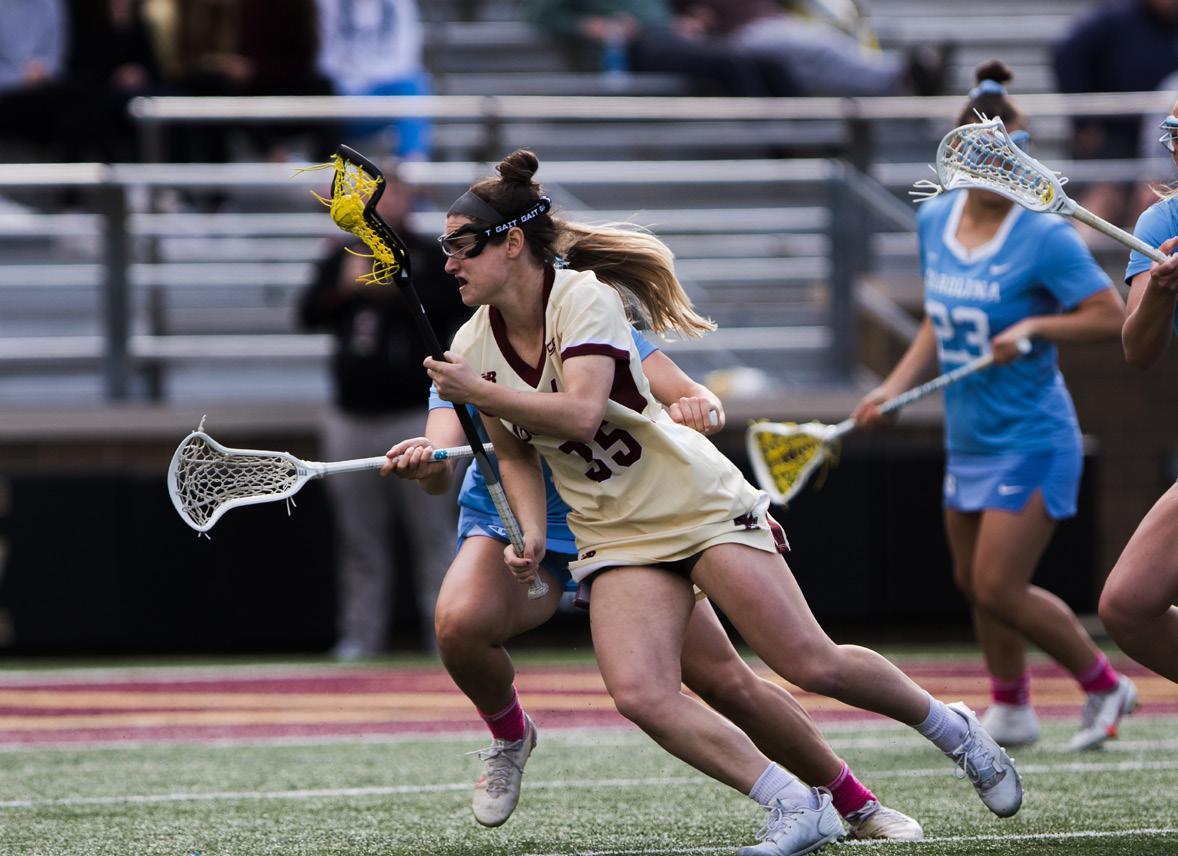
overcome the Tar Heels, earning its first loss of the season.
By the end of the game, six BC players scored at least one goal, with Charlotte North logging four, Jenn Medjid and Kayla Martello each earning a hat trick, and Caitlynn Mossman and Belle Smith each scoring two. Mckenna Davis scored once.
“We were just trying to stick to our game plan, but again, they’re an incredibly talented team,” North said. “Top to bottom, especially on the defensive end, I wish we could have had that one back, but we gave it all we had.” n
Who Will Win the NCAA Tournament?
Check out The Heights’ sports editors’ picks for who is going to win the 2022 NCAA men’s basketball Tournament.
First introduced to MLB in 1973, the designated hitter creates a new position tasked solely with hitting in place of a defensive player. Traditionally, this player replaces the pitcher in the lineup, but this is by no means a requirement—as seen in the case of Shohei Ohtani.
The issue of the designated hitter was resolved over a month before lockout negotiations ended. It has been discussed for years, and its early resolution is due to popularity among both league executives and players.
Ott: The universal DH is a flawed attempt to broaden baseball’s appeal.
American League baseball is plastic. It’s a fake, sculpted-silicone version of what once was, wrapped in the most digestible, consumerist packaging possible. It’s Banksy street art behind glass in a billionaire’s art collection. It’s the hippies of the ’60s voting for Reagan in the ’80s, and it’s Metallica suing people for downloading its music.
Why? The designated hitter is a sellout.
It takes baseball—a game of strategy, chance, and tradition—and strips it of everything redeemable. The universal DH sacrifices what makes baseball great for a faster pace and more action in hopes of appeasing non-fans complaining that the game is boring.
SPORTS A14 Monday, March 21, 2022 The heighTs
College
16 8
Boston
Virginia
On Feb. 10, 2022, Major League Baseball Commissioner Rob Manfred announced the league would implement a universal designated hitter across both the National and American leagues as part of ongoing lockout negotiations between players and owners.
asa ackerly
ethan Ott
meGan Gentile
ethan Ott
Graham Dietz
See Universal DH, A15
NICOLE WEI / HEIGHTS STAFF
Gonzaga Kansas Gonzaga
BC Holds Its Own in Florida State Weekend Series
By Katherine Whelan Heights Staff
Coming into its weekend series against No. 2 Florida State, the Eagles faced their toughest challenge of the season. Up until Sunday morning, the Seminoles had seen only one loss on the season.
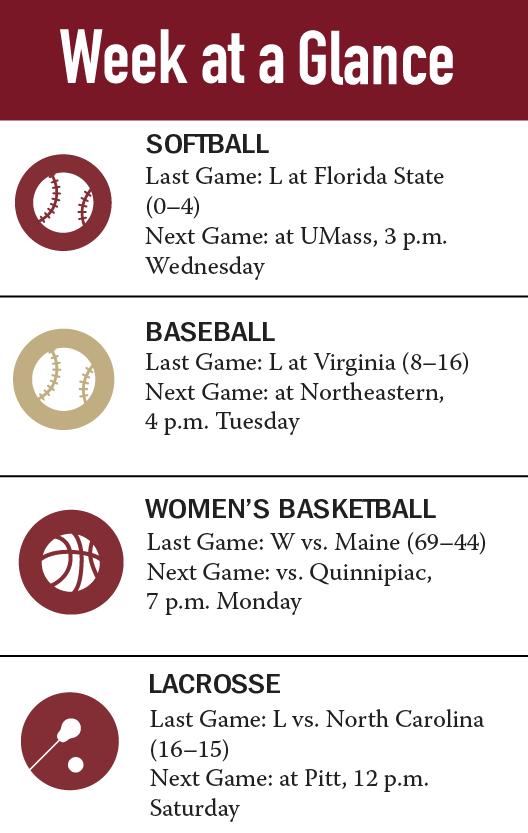
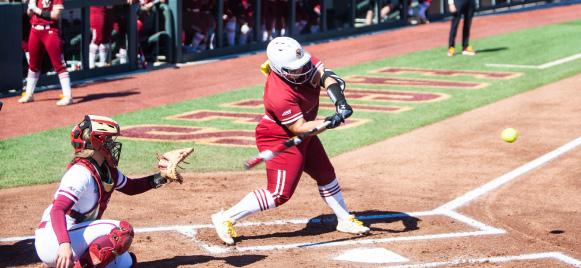
Despite
losing the series, the Eagles (13–11, 2–4 Atlantic Coast) remained persistent all weekend, earning one win out of the teams’ three matchups. After being shut out by Florida State (27–2, 16–2) 4–0 on Saturday, Boston College softball defeated the Seminoles 2–0 in its first game on Sunday. The Eagles closed out the weekend with a 4–0 loss.
Even with BC facing its highest-ranked opponent of the season, head coach Amy Kvilhaug said after the game that her team did not prepare for the game any differently than it had in the past. With a heavy emphasis on both offensive and defensive discipline, as well as pitching, she said the team focused on consistency during the series with the Seminoles.
The first inning of Sunday’s second game was slow for both teams, but Florida State broke the lull in the bottom of
the second. BC’s Abby Dunning walked Michaela Edenfield to start off the inning. She was thrown out at second, but her teammate Devyn Flaherty reached first, stole second, and made it to third on a fielding error by the Eagles. Hallie Wacaser followed with a foul out, but she brought Flaherty home on the at-bat to end the inning with the Seminoles up 1–0.
In the third inning, BC continued its scoreless stretch, while Florida State powered ahead. In the bottom of the inning, Josie Muffley bunted to reach first. She advanced to second on a single by Kaley Mudge and scored on Sydney Sherrill’s RBI single up the middle. On Kalei Harding’s at-bat, Sherill advanced to third, and Mudge attempted to score but was tagged by catcher Hannah Slike.
While the Eagles’ offense was still quiet, the Seminoles snagged two more runs in the bottom of the fourth inning. Jahni Kerr singled up the middle and later advanced to second after Brooke Blankenship walked.
Mudge then hit a single and advanced to second on the throw, pushing Blankenship to third and Kerr to home. Dunning walked Sherrill and was replaced on the mound by Susannah Anderson. In the following play, Harding reached on an error by third base, which allowed Blankenship to score. The inning ended with the Seminoles on top, 4–0, and the score remained the same for the rest of the game.
Although BC’s offense failed to find a scoring opportunity for the remainder of the game, Anderson kept her team’s defense tight and didn’t allow any more runs.
“At the end of the day, this is the level we want to compete at,” Kvilhaug said. “Our student-athletes proved to themselves this weekend that they can play with anyone in the country.”
Earlier in the morning, BC became the second team to upset the Seminoles in the 2022 season.
The game went scoreless through seven innings, sending both teams to extra innings. In the top of the eighth, the Eagles broke open the scoring off a single from Nicole Giery that scored Maddy Carpe.
Erika Andal singled to center later in the inning, scoring Gianna Sarlo to secure BC the 2–0 victory—its first win against a ranked opponent this season.
Pitcher Peyton Schnackenberg threw all eight innings for the Eagles, holding Florida State to just one hit. With the win, she advanced to 6–1 on the season, and she leads BC’s pitchers with a 2.55 ERA.
BC’s Saturday outing played a similar tune to its Sunday shutout loss. Florida State scored once in the first inning and three times in the third inning. Kerr hit a two-run double to put the Eagles at a four-run deficit. The Seminoles never looked back, and neither team scored for the rest of the game. n
Does Universal DH Help MLB?
And when pitchers get on base, the wait is well worth it.
Thanks to the DH, the American League looks like the National League summering in Orange County with lip fillers, a leased Ferrari, and spray tan. Now, because of Manfred and the universal DH, this is all of baseball’s reality.
Prior to 1973, baseball players played baseball. Everyone on the field hit and played defense, pitchers included. After the American League implemented the DH, however, the game was marred forever.
Suddenly, you got to pick. You could play offense, defense, or both. It’s like if you told James Harden that he could hang out on one side of the court and play offense, and Draymond Green would take his spot on the other side playing defense.
This idea is such an obvious cop out it’s senseless. So, why did the MLB implement it? The answer is as simple as it is deplorable: because pitchers are bad at hitting, of course.
But the stereotype that pitchers can’t hit is false. From 2011–2021, 16 pitchers with at least 50 plate appearances batted over .200. In that same time period, 195 position players with at least 50 plate appearances batted under .200.
In 2021, Atlanta Braves pitcher Max Fried had the highest pitcher batting average at .273. For reference, Giancarlo Stanton also hit .273 in 2021. Fried is a pitcher, and Stanton is batting cleanup for the New York Yankees on a $325 million deal.
Colorado Rockies starter German Marquez was the second-best hitting pitcher in 2021. He posted a .264 average and a .415 slugging percentage. Mookie Betts also hit .264 in 2021. Betts bats leadoff for the LA Dodgers on a $365 million deal.
In 2017, Madison Bumgarner became the first pitcher to hit two home runs in a game on opening day against the Arizona Diamondbacks. When you google 2017 San Francisco Giants highlights, that’s the first video that pops up.
When Giants pitcher Kevin Gausman stepped up to the plate as a pinch-hitter on Sept. 17, 2021 against the Atlanta Braves, his season was on the line. The Giants were in the midst of a season-long fight for first place in the NL West and held a slight twogame edge on the Dodgers.
Gausman had a chance to send his team home with a win in the 11th inning and had the green light with a full count and one out. He got under a pitch down the middle, lofting it into right field as Oracle Park escalated into a roar. Brandon Crawford dove into home and was called safe to seal the win, and the rest of the Giants swarmed the field, mobbing Gausman as he rounded first.
“That was the coolest thing I’ve ever done in my entire career,” Gausman said after the game. “When it was 3–2 and everybody stood up, it probably was one of the coolest moments of my life.”
The most adverse effect of the designated hitter is its effect on strategy. One of the most important jobs of a manager is knowing how to use your pitchers. The decision to pull a starter is often dictated by where in the lineup that starter is batting.
The strategy gets even more complex when considering things like double switches and conserving pinch hitters in extra-inning games.
It is nonsensical for a player to only play on offense.
The effect of this is the presence of athletes—Prince Fielder, Albert Pujols—who look like they belong in an elderly home or esports tournament rather than at the highest level of one of the most physically taxing sports in existence.
While the rest of his team puts it all on the line on both offense and defense, the designated hitter gets to sit back and only step up to the plate three or four times per game. It doesn’t make sense. Hockey players play offense and defense. Basketball and soccer players do too. Why shouldn’t baseball players? Their other eight teammates do.
Sacrificing the strategy and tradition that makes baseball great for a rule aimed at appeasing non-fans is a sad move by Manfred. It’s just one more move in a series of pathetic attempts to grow baseball’s fan base to a demographic with no interest in the sport.
MLB is not the NFL or the NBA, and sacrificing what is special about the game to make it a little more fast paced or exciting is disgraceful to its authentic form. The designated hitter represents the shift to a manufactured, materialistic brand of baseball, and fans can only hope the sport survives its current crisis.
Ackerly: Pitchers underperform at the plate, and a universal DH would promote a more enjoyable brand of baseball.
Ethan, I see we are back again for a third round of our favorite game show: innovation-happy technocrat versus old man-yells-at-cloud baseball purist. In our first two bouts, I hitched my wagon to the romantic horse, arguing that MLB should not use robot umpires and that college baseball should not adopt the extra-innings, runner-on-second rule.
For our third battle, I’ve let you take the side of baseball nostalgia. Debating the universal introduction of the designated hitter is not a duel between baseball history and unnecessary, gimmicky adjustments like the robot umps and extra innings changes. It is a question of whether we would like to watch, write about, and dedicate ourselves to a game that is more enjoyable or less.
Pitchers cannot hit. They have never been able to hit. In the over 50 years since the National League turned its cheek to the American League and decided to keep pitchers batting, the overall pitcher batting average has never surpassed .150. The year 1998 was one of the best years for pitchers at the plate. Their cumulative slash line that season? .146/.187/.183.
Things have only gotten worse in recent years as pitch velocity has increased and pitchers have become less prone to just feed strikes to their temporarily inconvenienced peers and wait for weak contact. The cumulative pitchers’ batting average has stood just a tick above .100 over the last couple seasons. Replacing pitchers with even average designated hitters would have handed every NL team an extra 80 runs in 2019, according to The Washington Post.
Baseball is a family game. The cannibalization can go on no longer. We have reached unprecedented heights of pitcher-on-pitcher crime, and it must be stopped.
In a joyous land of milk and honey where runs came aplenty and MLB stadiums were full, those extra 80 runs might not be a huge issue. But nowadays, as scoring reaches record lows and attendance continues to fall, losing those runs has become much more of a problem. There is nothing romantic to the average fan about a rally-killing
strikeout against a pitcher at bat or an intentional walk to a hot, eighth-place hitter to bring up a batter who is, at best, hopelessly overmatched and, at worst, disinterested.
Pitchers have provided some incredible moments at the plate over the years, and as San Francisco Giants fans, Ethan and I have been privileged to enjoy more than our fair share.
Just this past year, Gausman gave the Giants a key September victory over the Braves with a walk-off sac fly in extra innings. Two weeks later, Logan Webb capped off a stellar eight-inning performance with a two-run home run and joked after the game that he needed the hit to keep up with Gausman.
Pitcher heroics at the plate are not new in San Francisco. Bumgarner hit 19 home runs during his time in the Bay, a hitting tenure peaked by a ridiculous 2014 season in which his OBP stood 50 points above league average—the league average for everybody.
Still, for every Webb home run and Gausman walk-off, there are hundreds more pitcher at-bats that end with a strikeout or weak grounder to the mound. Bumgarner’s 2014 is the massive exception to the rule, a shining light that is held up by those that argue against the DH, but that should have no bearing on the decision.
There is a time and place to choose romanticism over efficiency. Robot umpires affect every pitch. Extra innings rules come into play regularly. Those changes immeasurably affect our experience and understanding of the game. What is the frequency of these memorable at-bats that create our fantasies about pitchers hitting? Every month? We are sacrificing improvement to every game for a handful of laughs and feel-good stories every season. No more. n
SPORTS A15 Monday, March 21, 2022 The heighTs
The Eagles battled through a three-game weekend series with Florida State, winning one game and losing two.
IKRAM ALI / HEIGHTS SENIOR STAFF
Boston College Florida State 0 4 Boston College Florida State 2 0 Boston College Florida State 0 4 Universal DH, from A14
Point/Counterpoint:

 By EliZa hErnandEZ Editorial Assistant
By EliZa hErnandEZ Editorial Assistant
















 By Stephen Bradley Magazine Editor MC Claverie Assoc. Magazine Editor and erin Flaherty Asst. Magazine Editor
By Stephen Bradley Magazine Editor MC Claverie Assoc. Magazine Editor and erin Flaherty Asst. Magazine Editor




















































